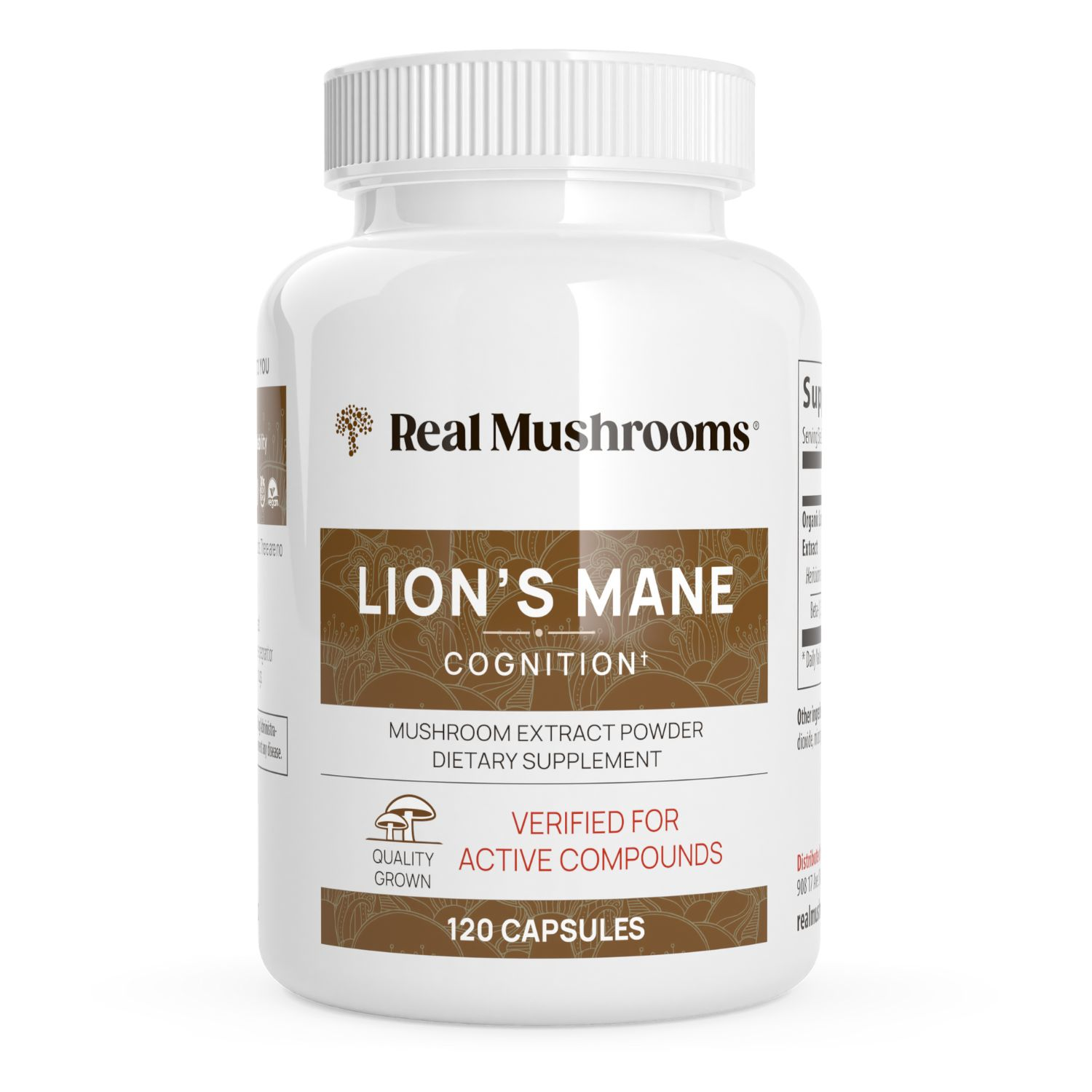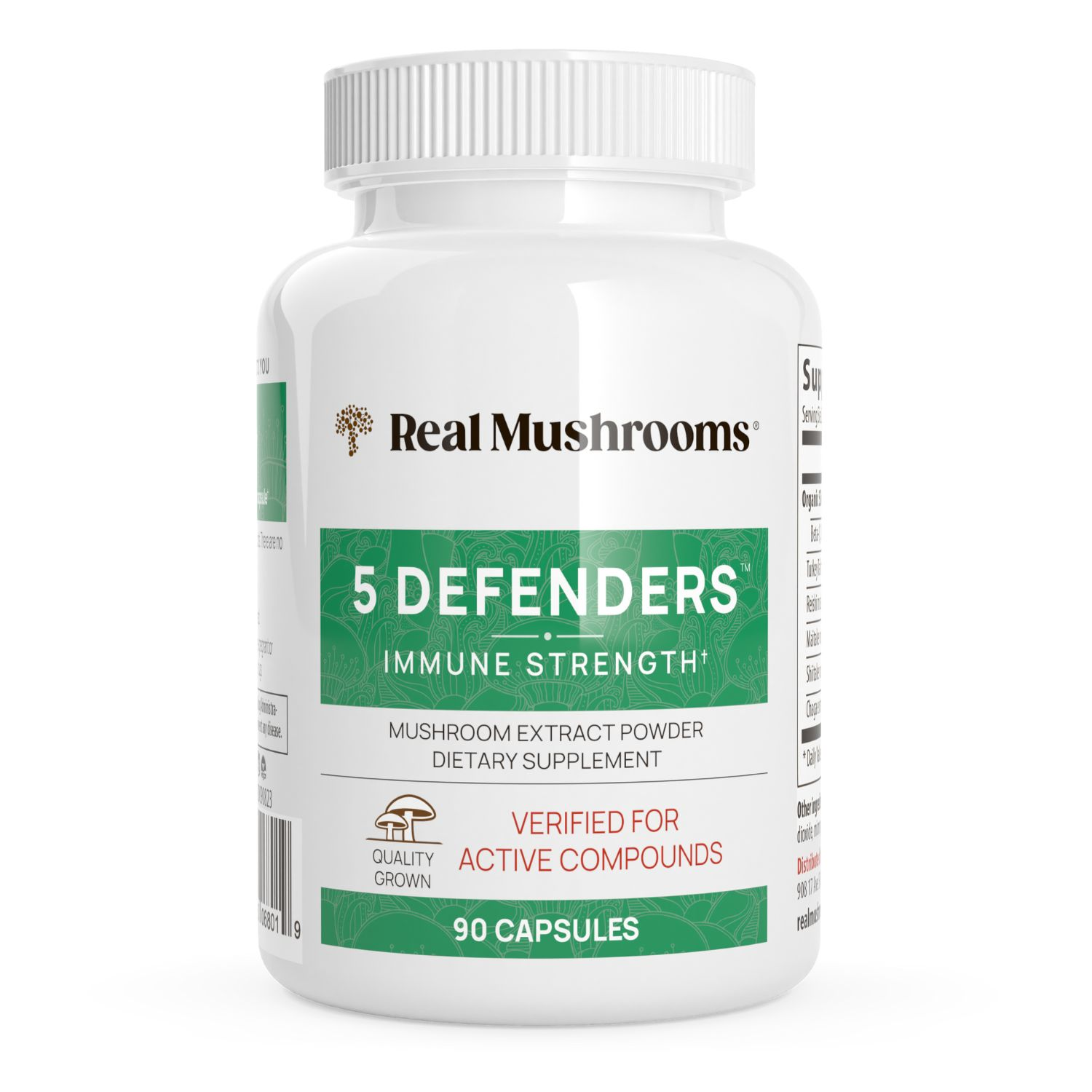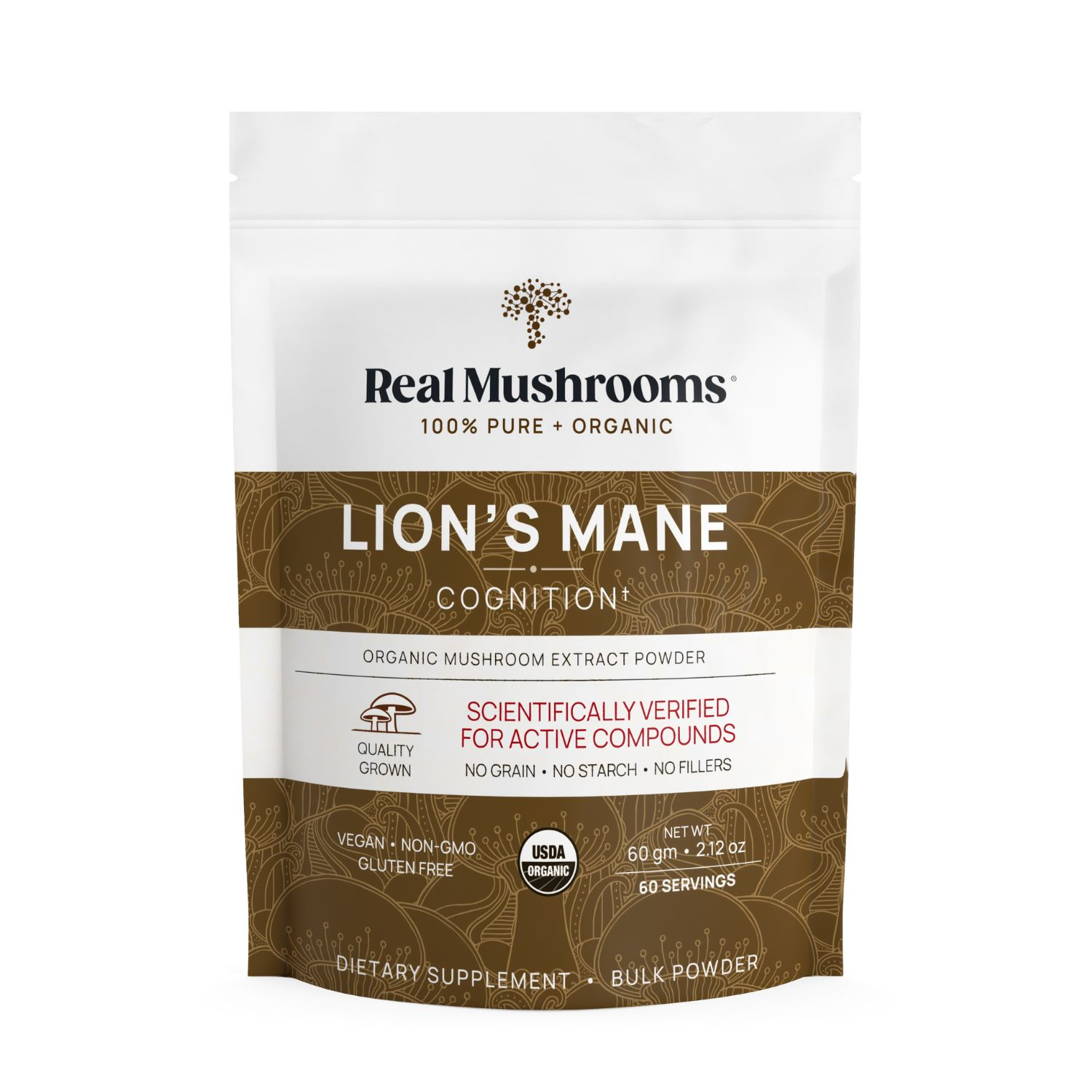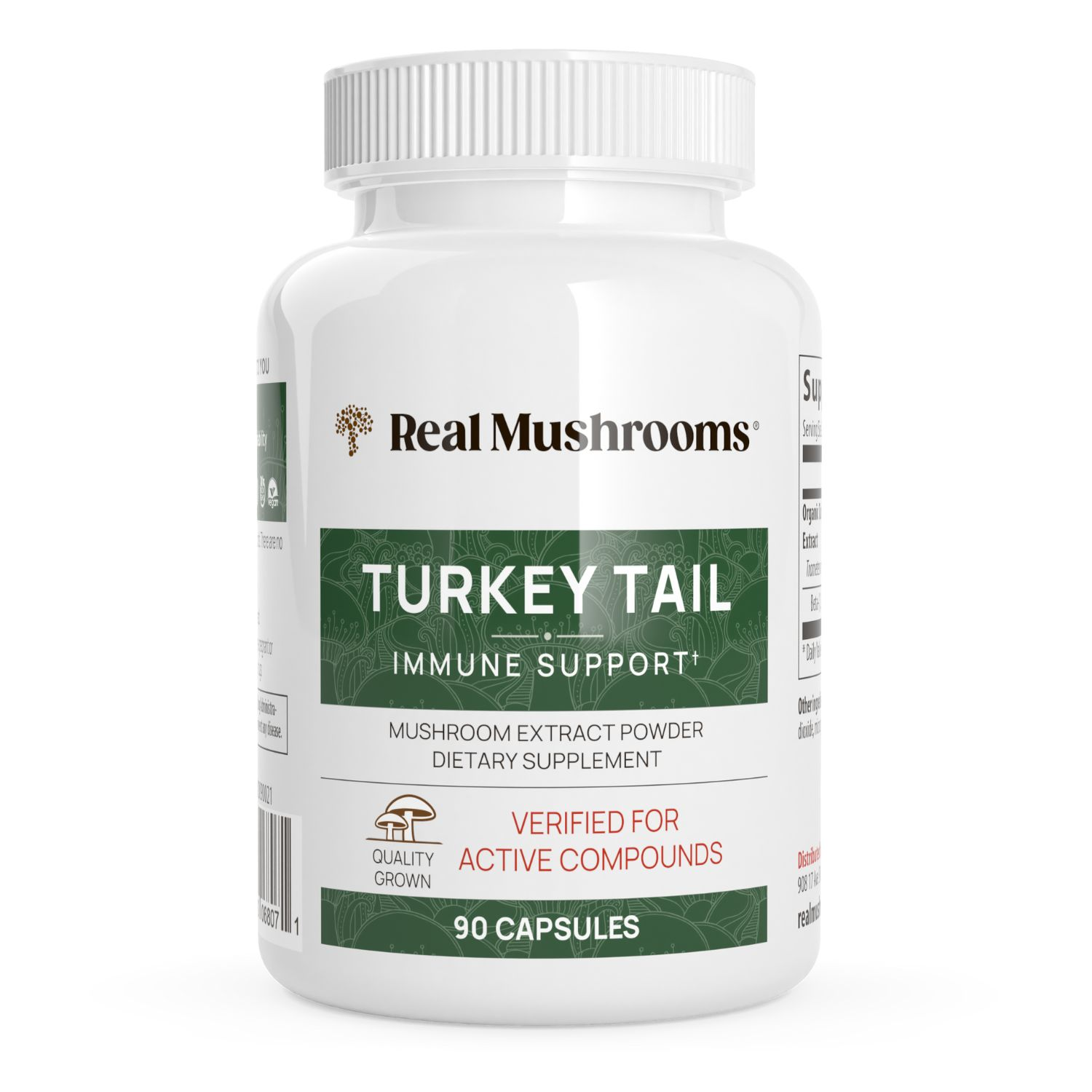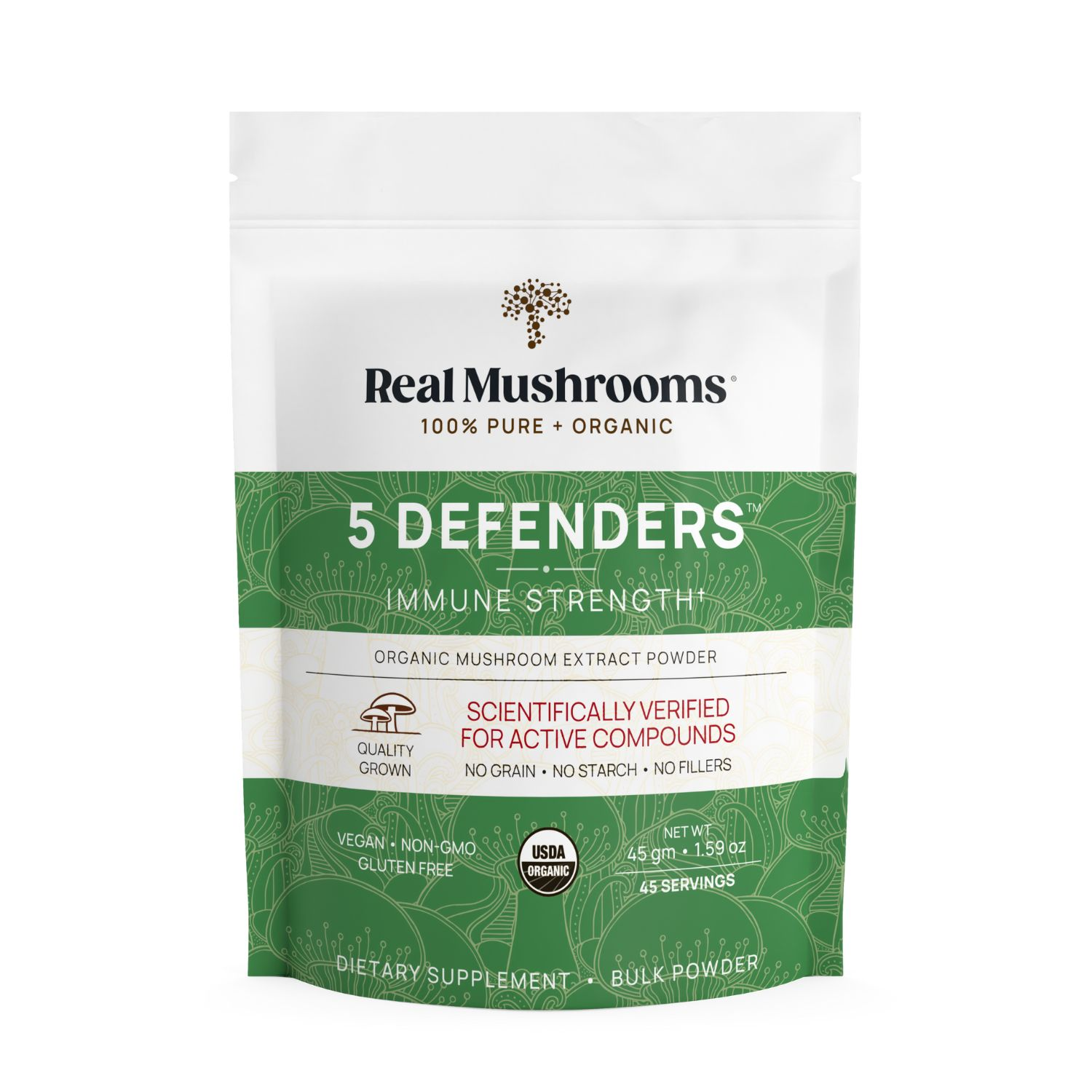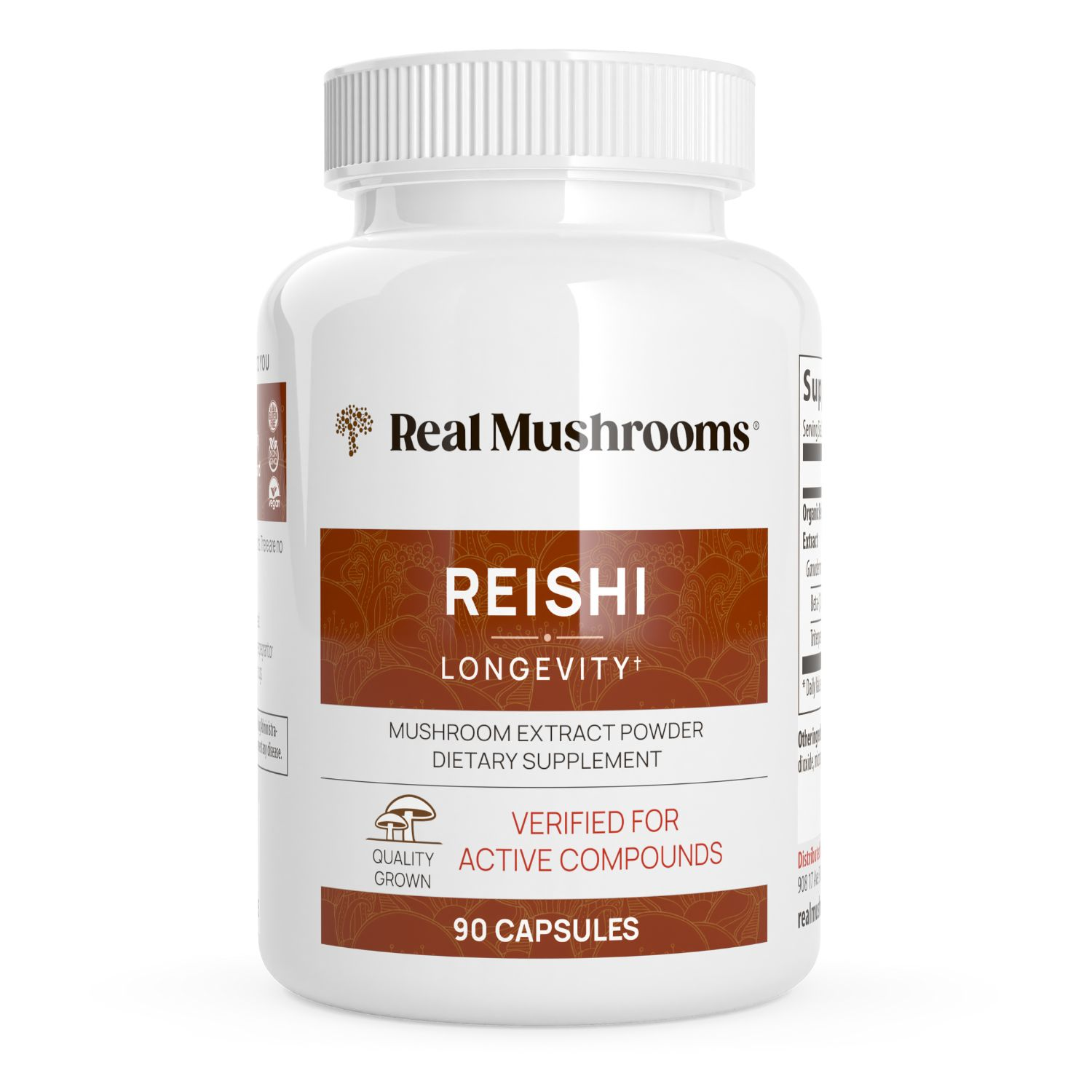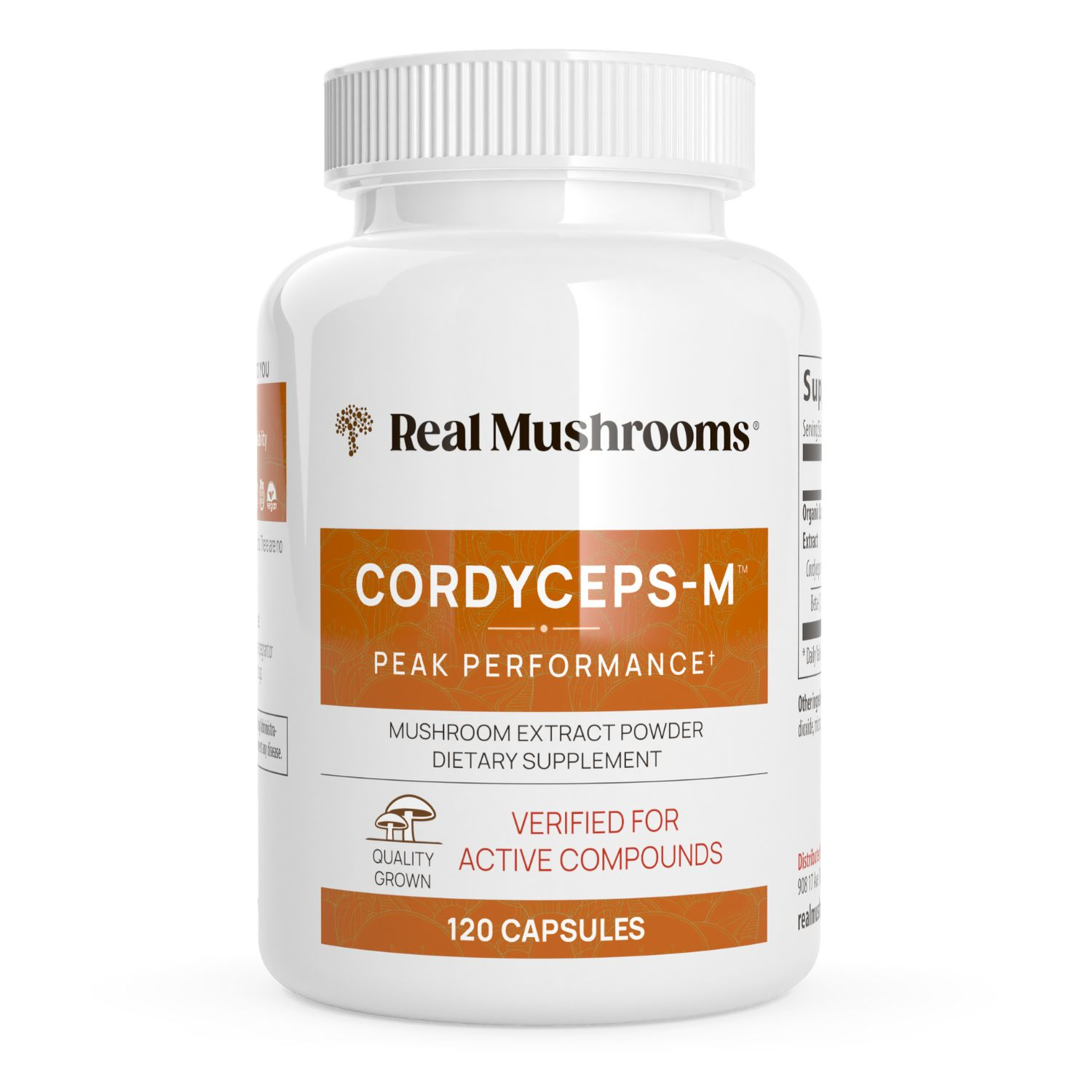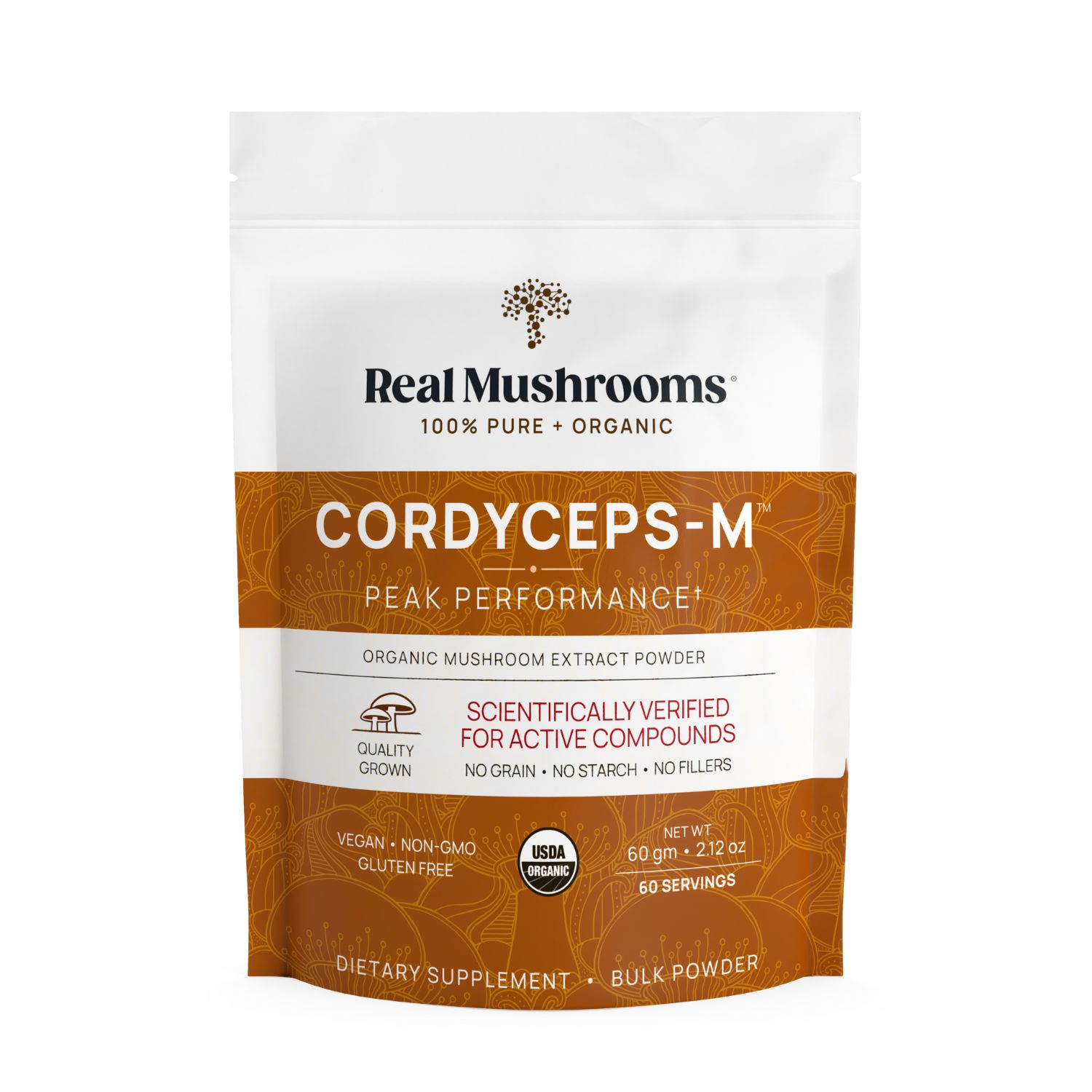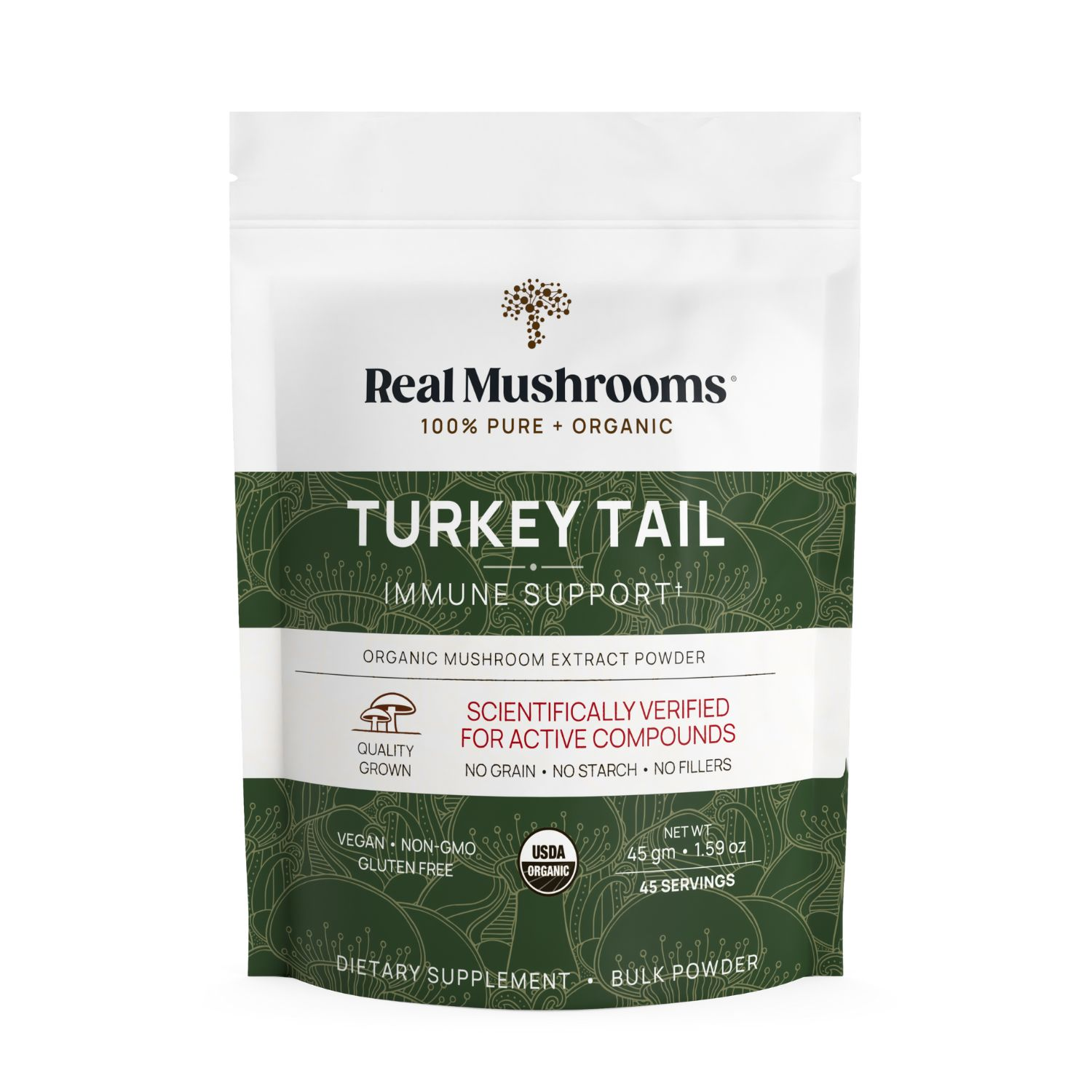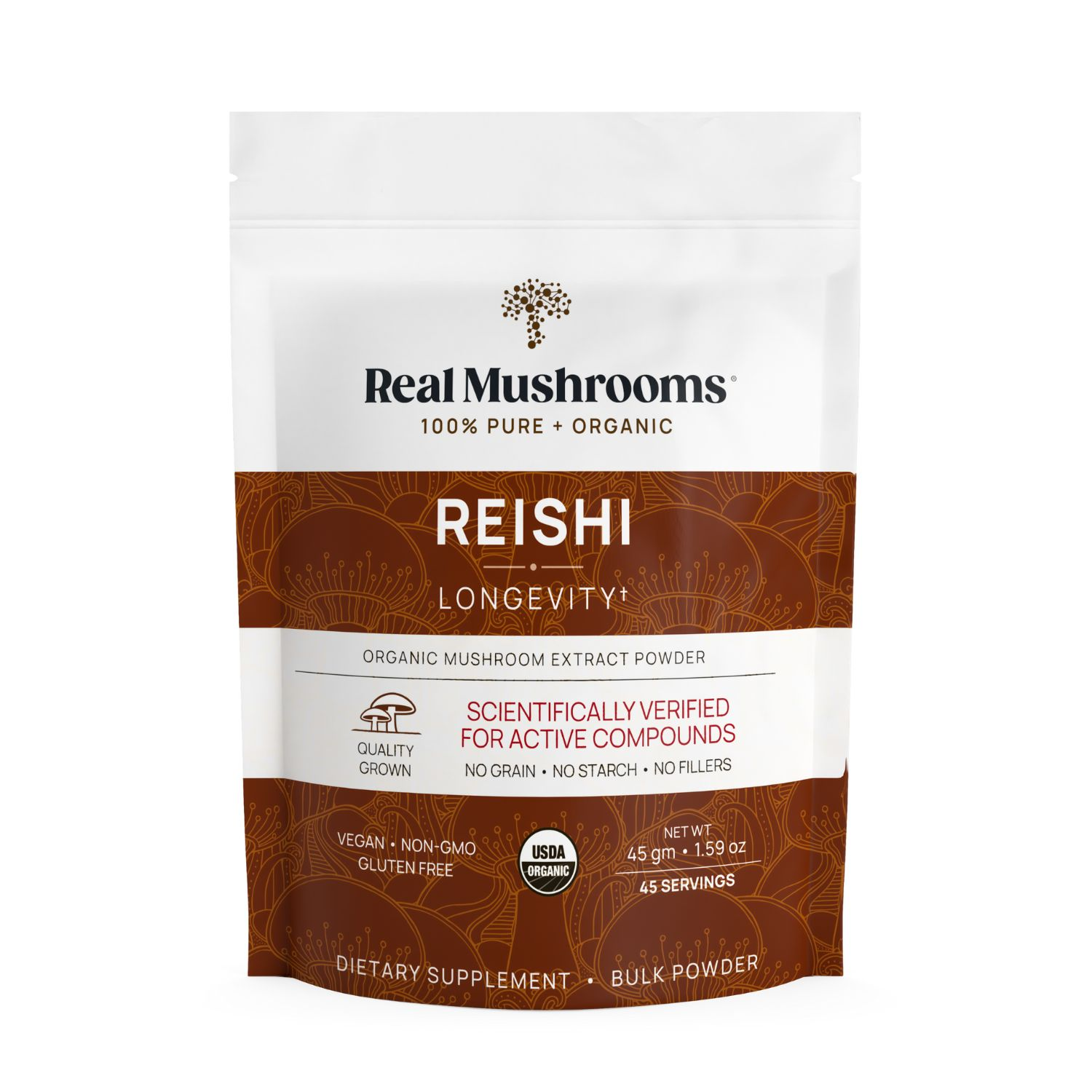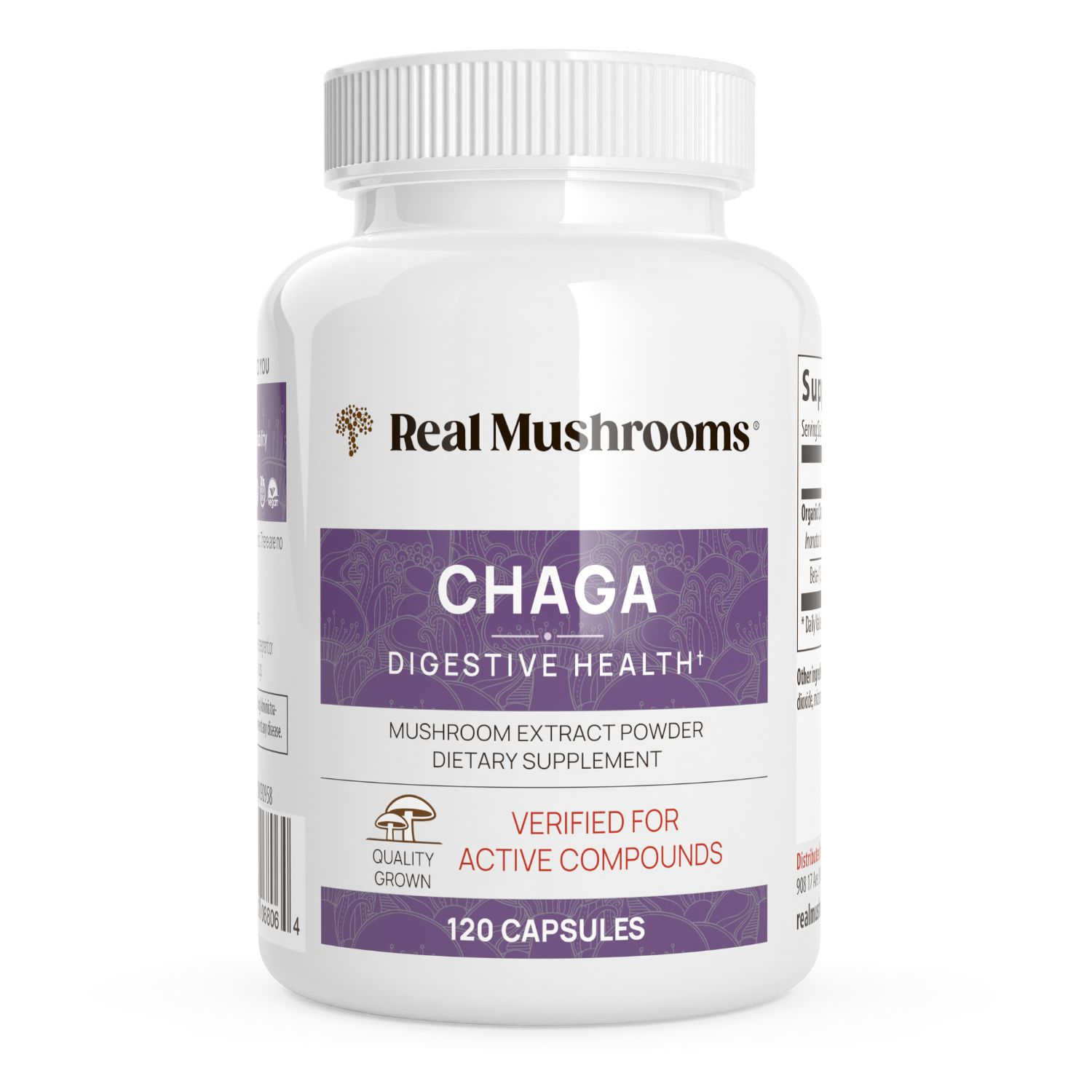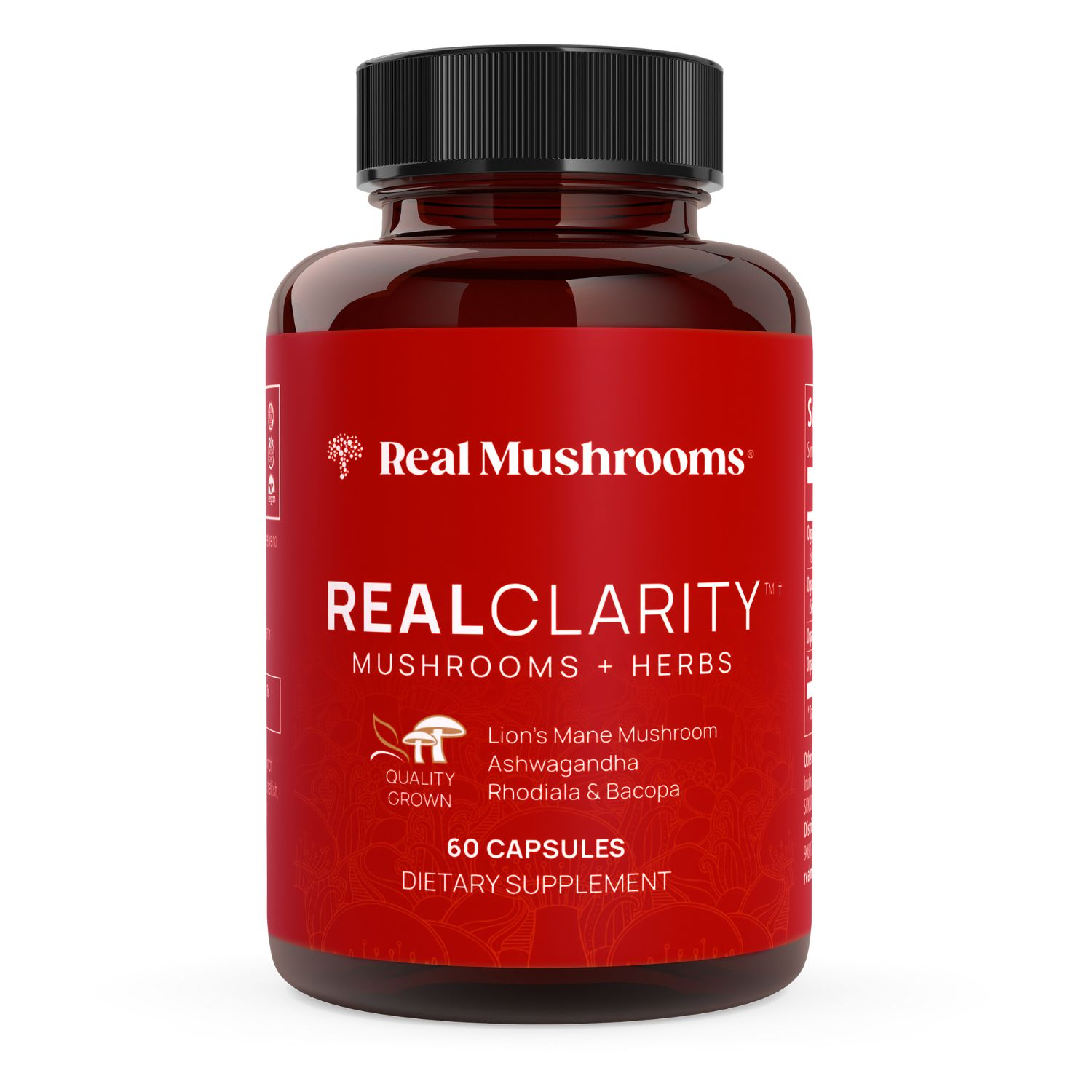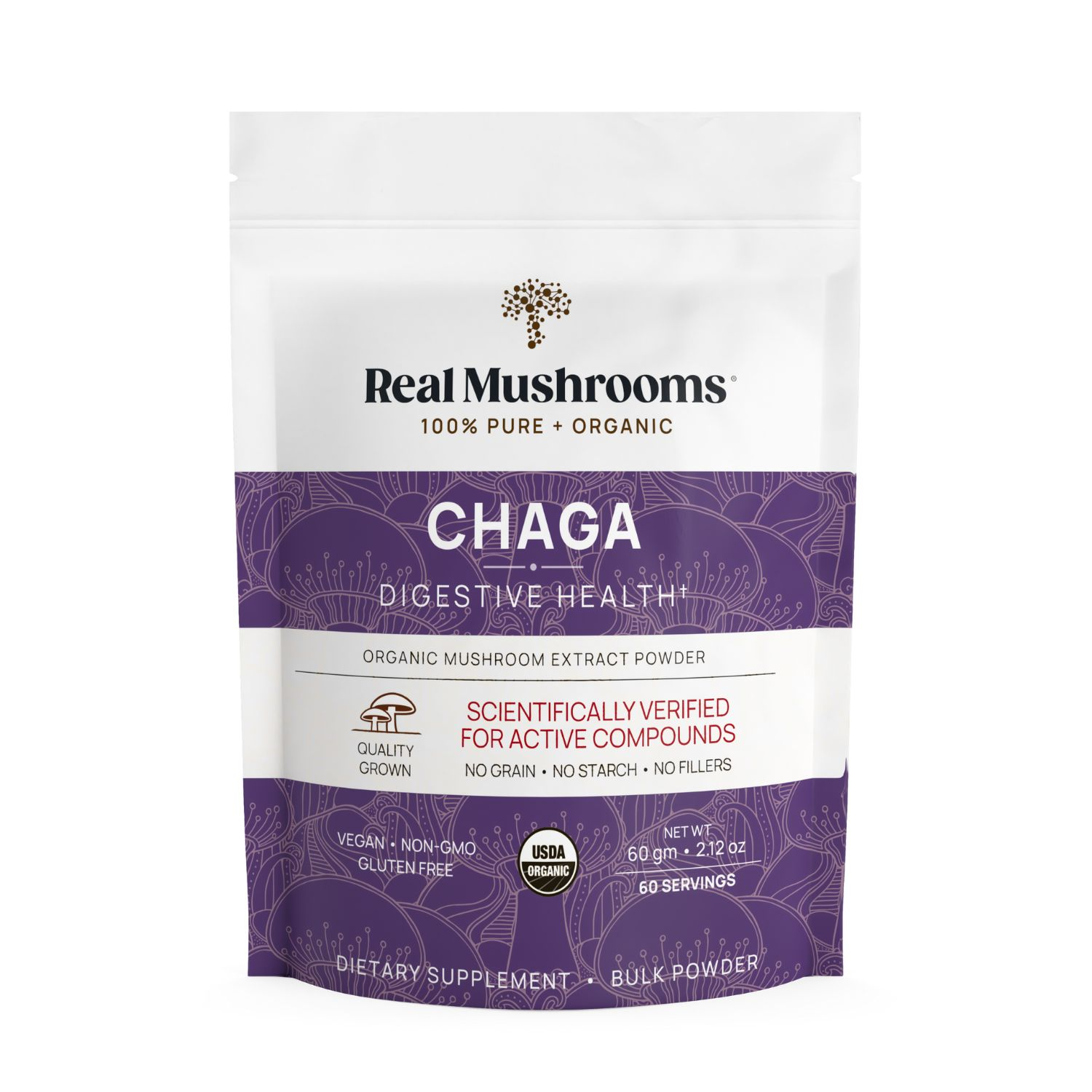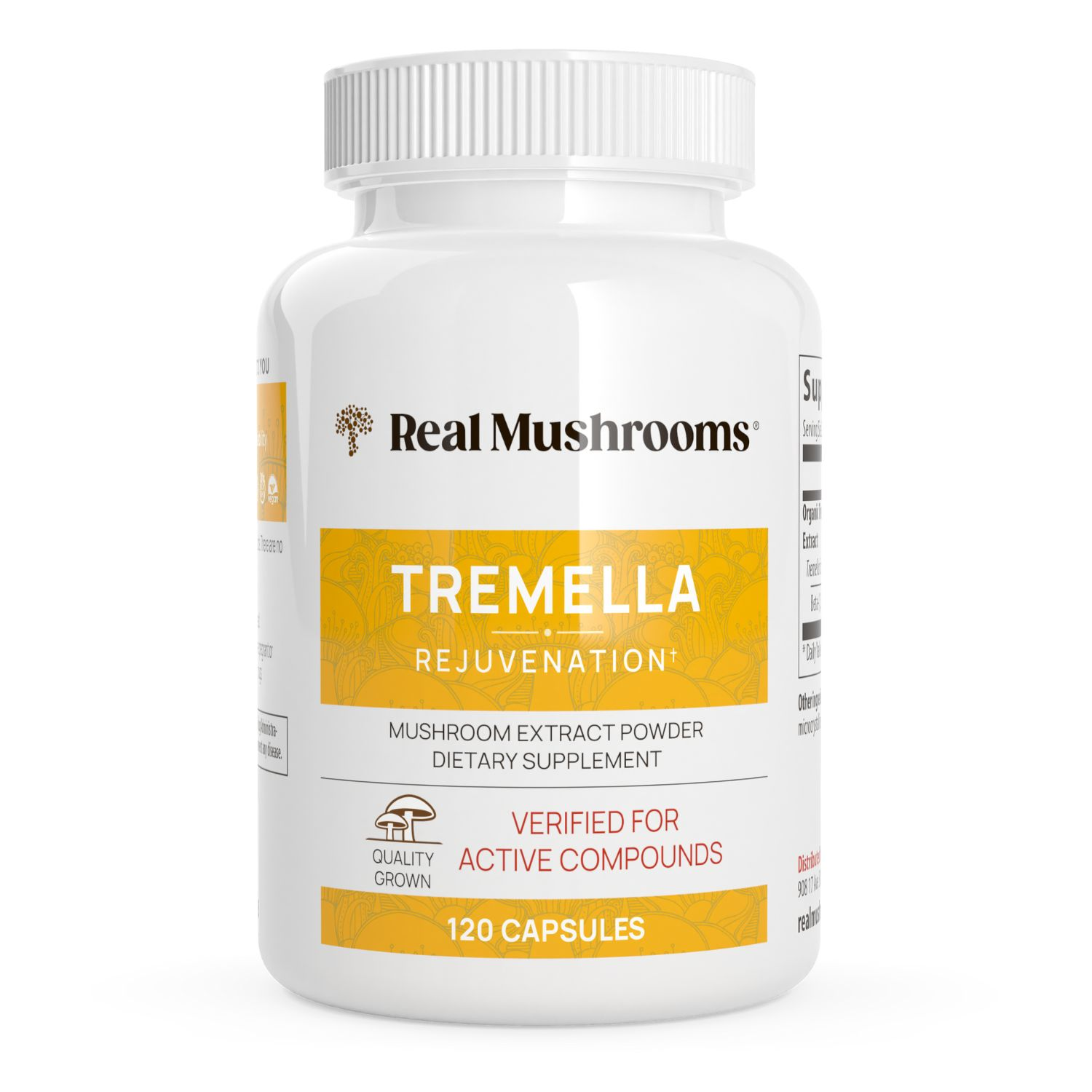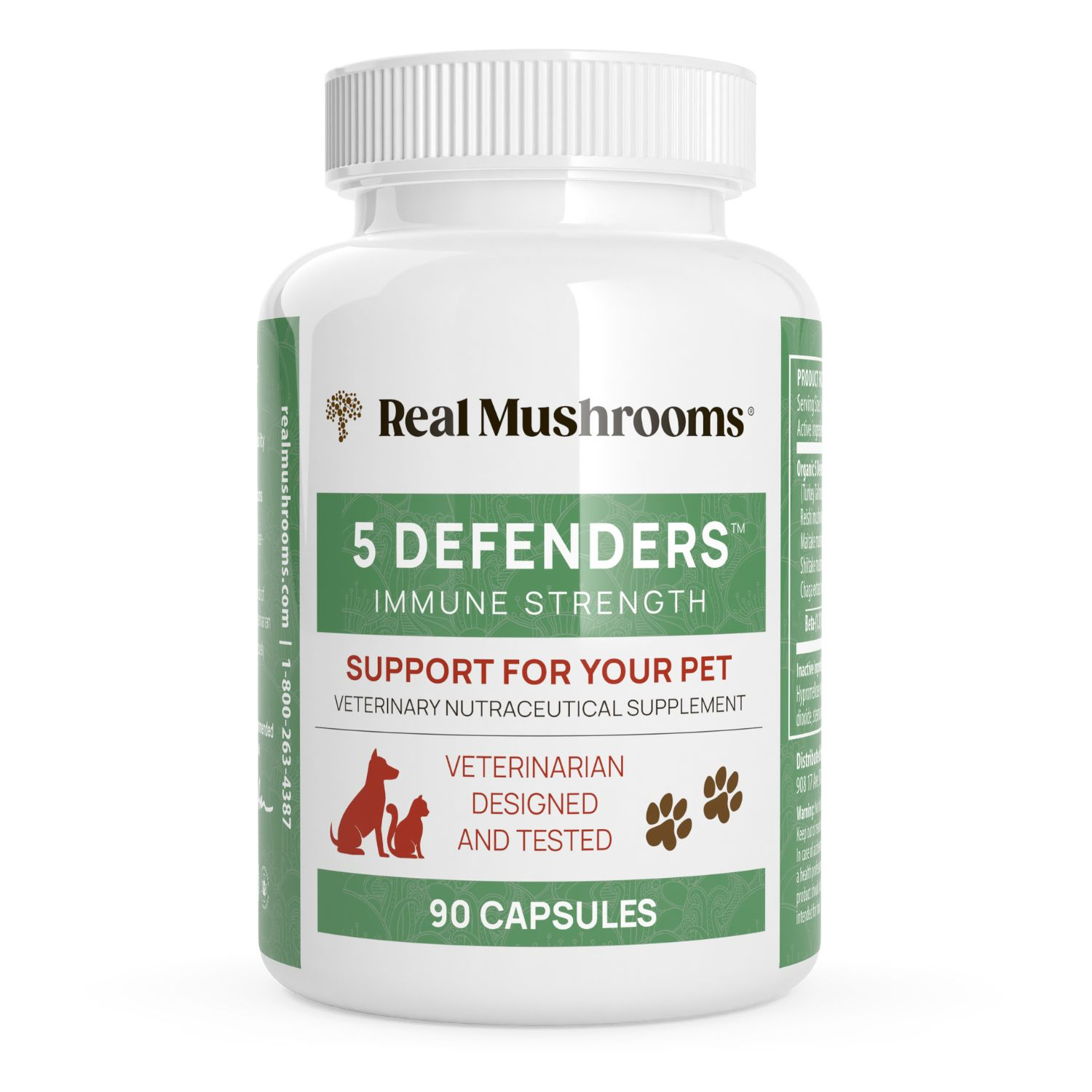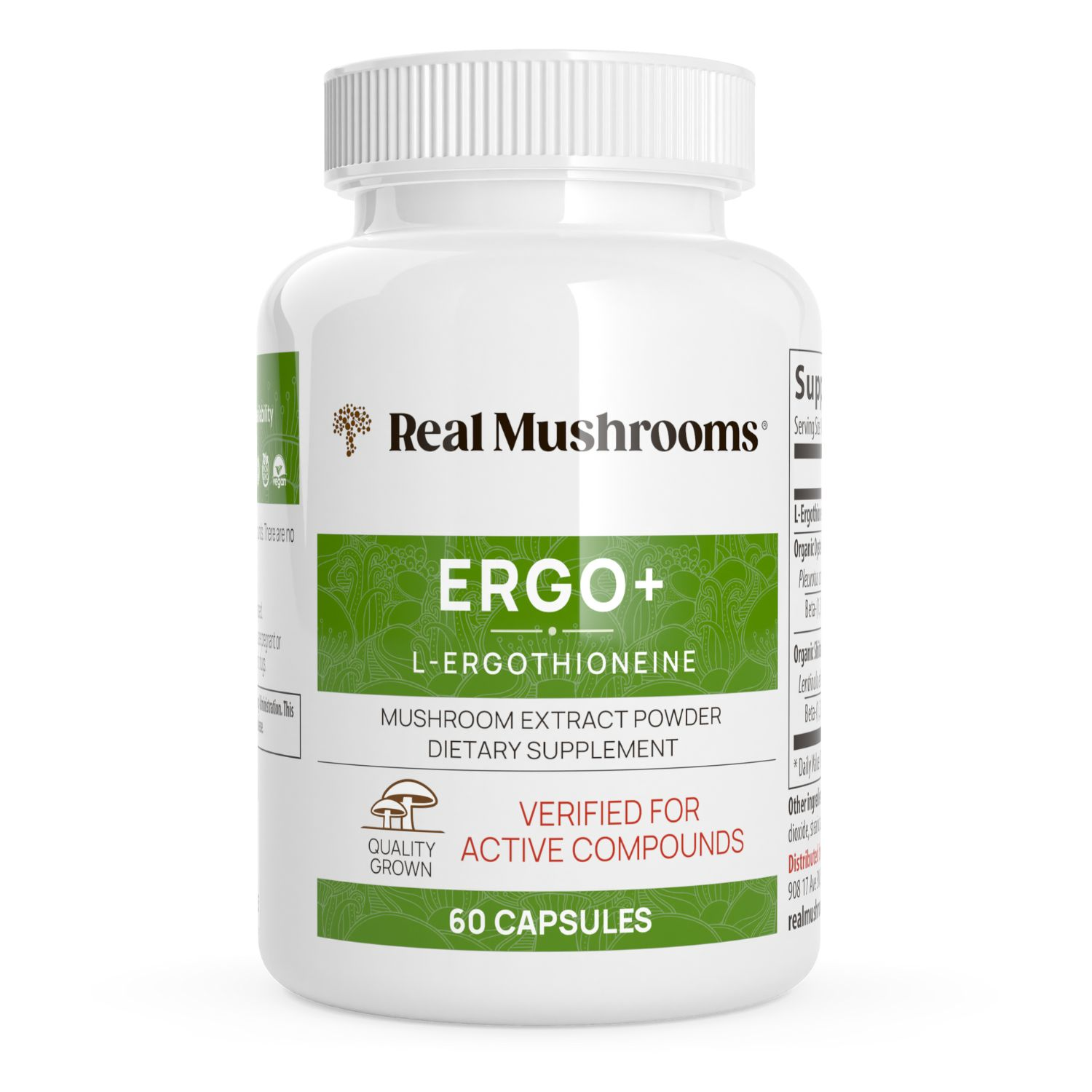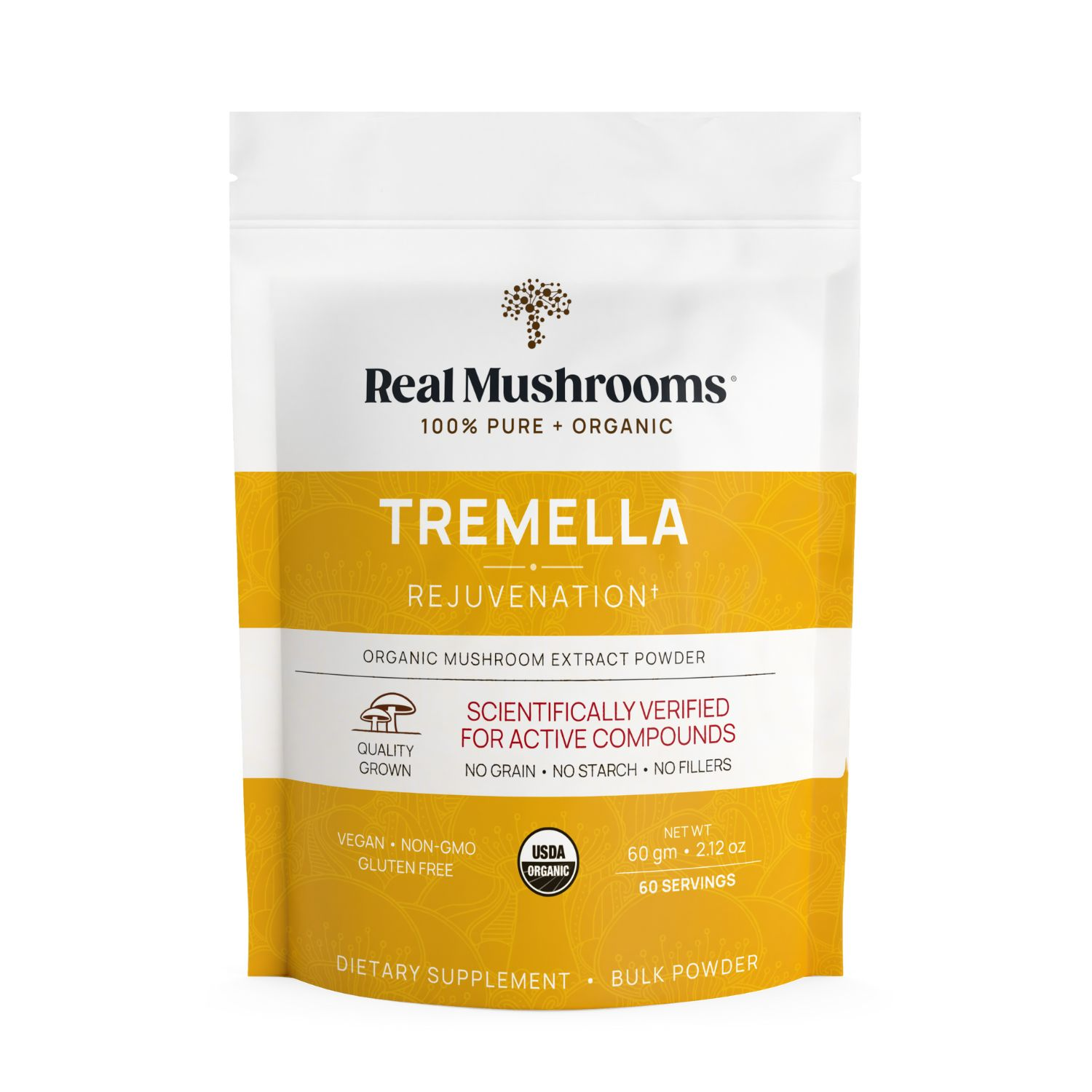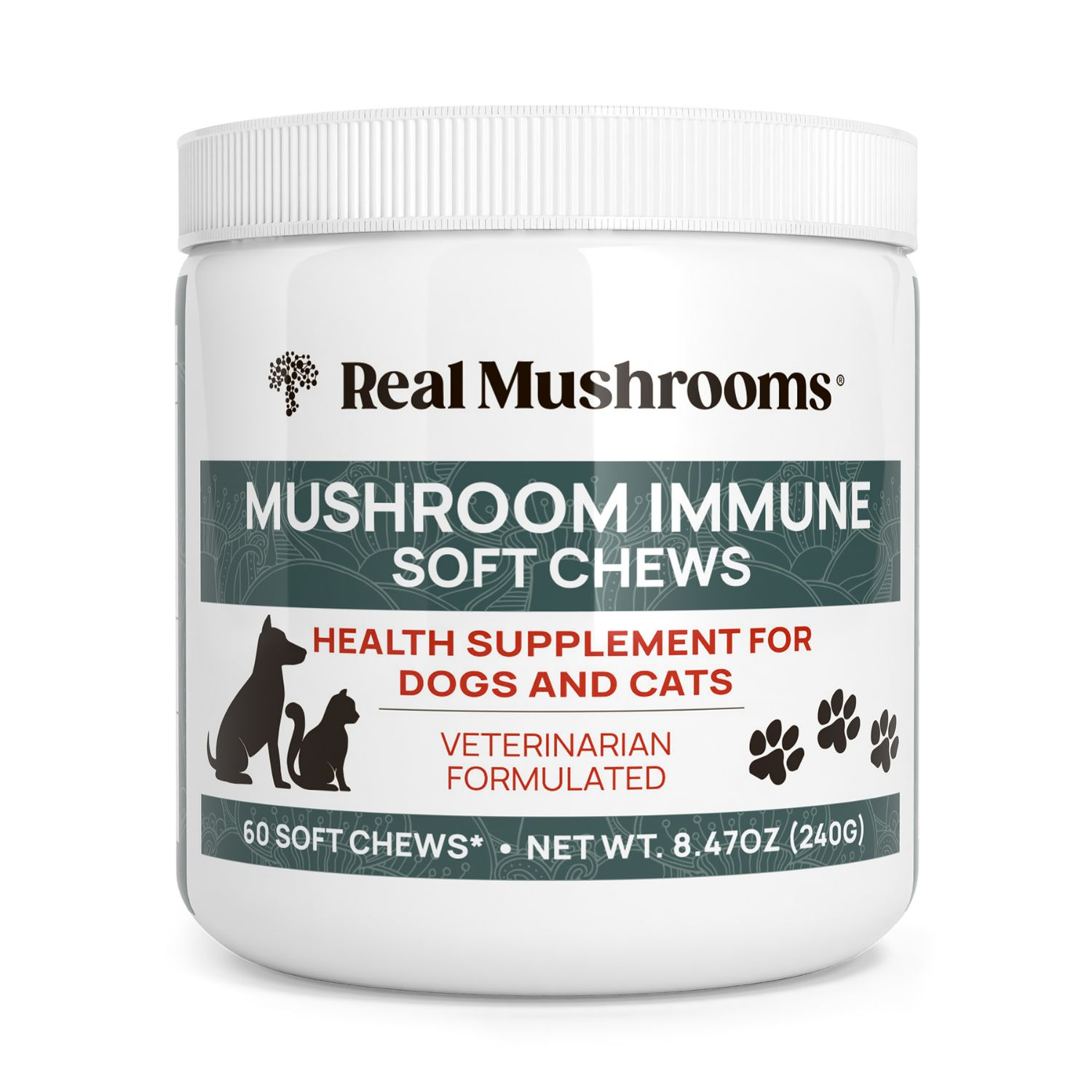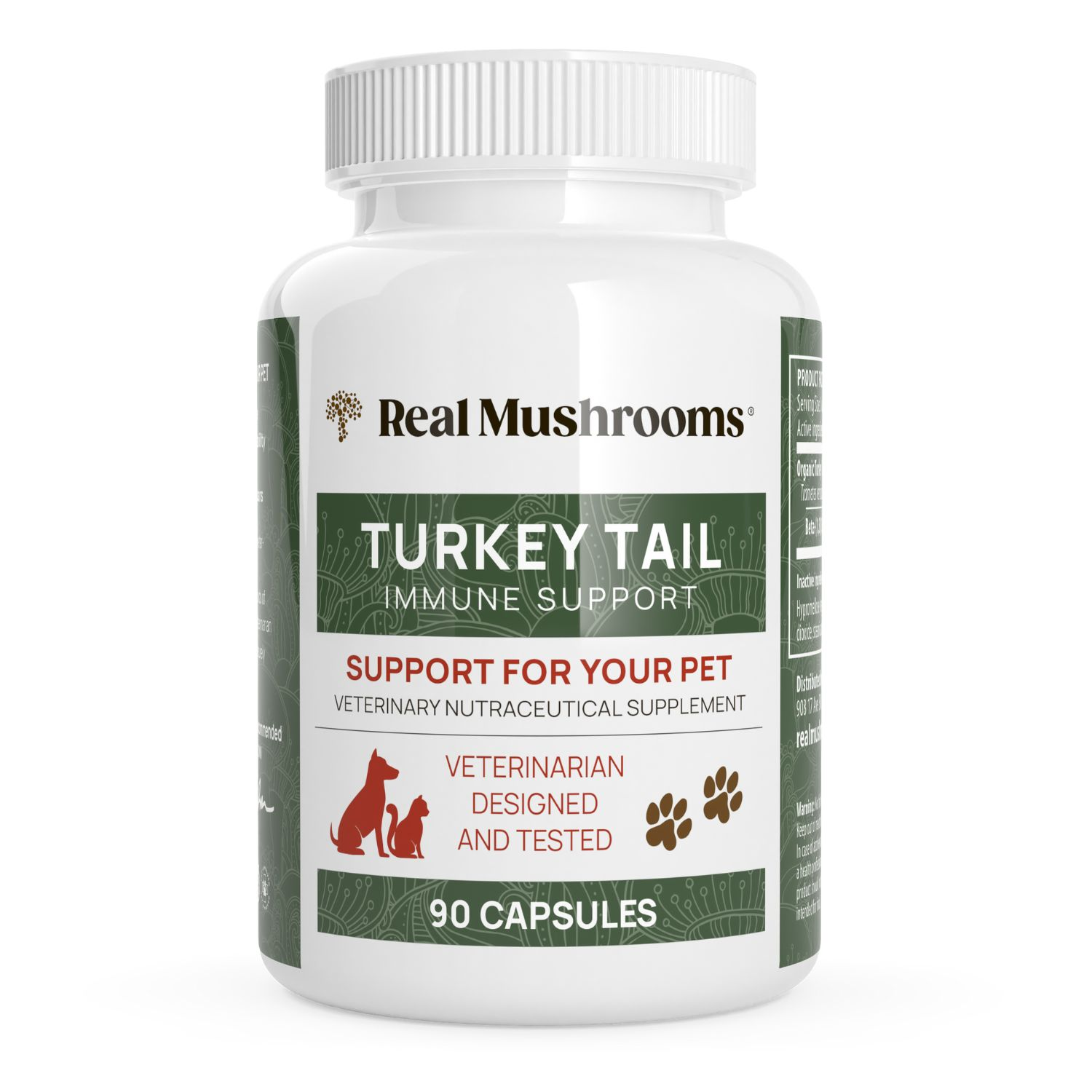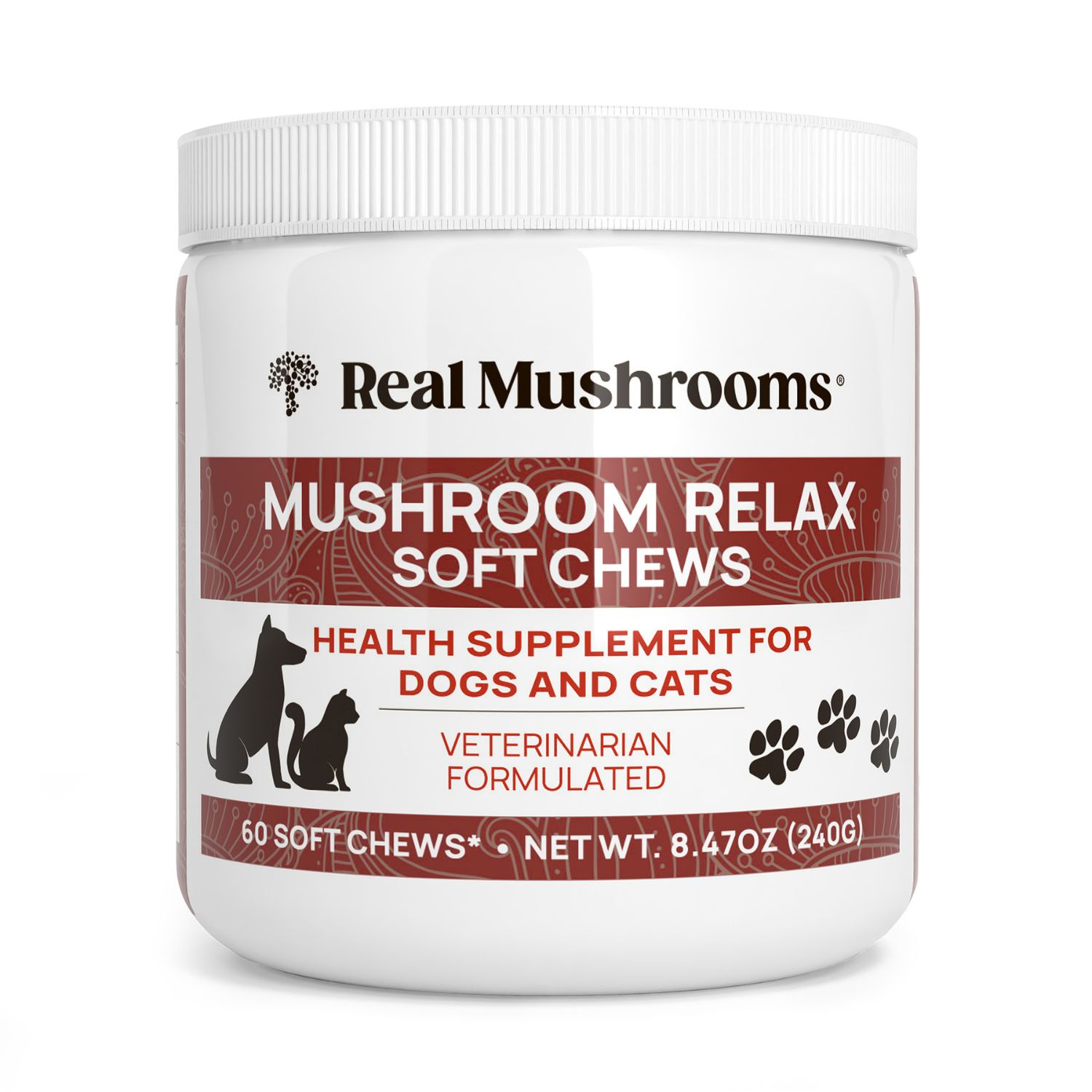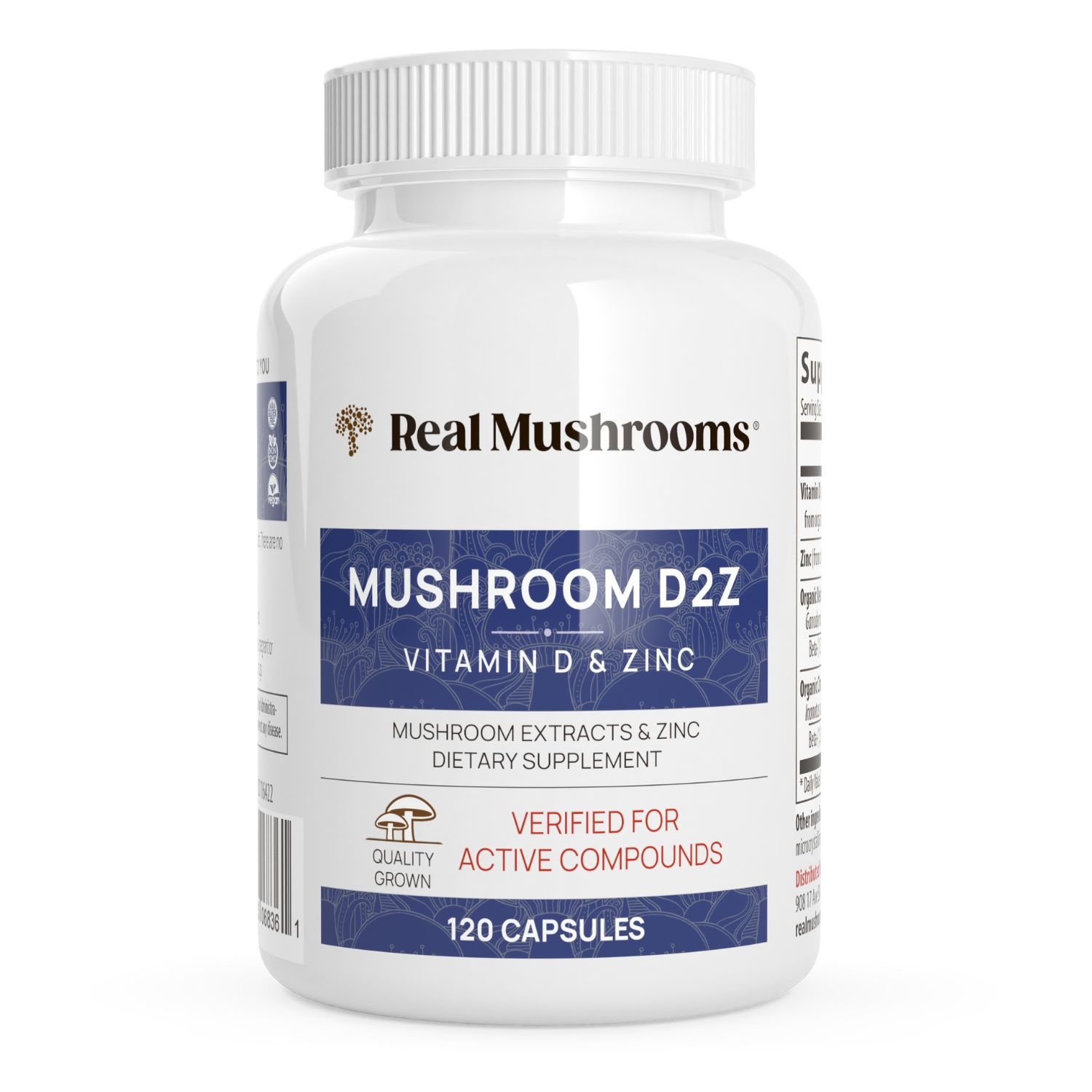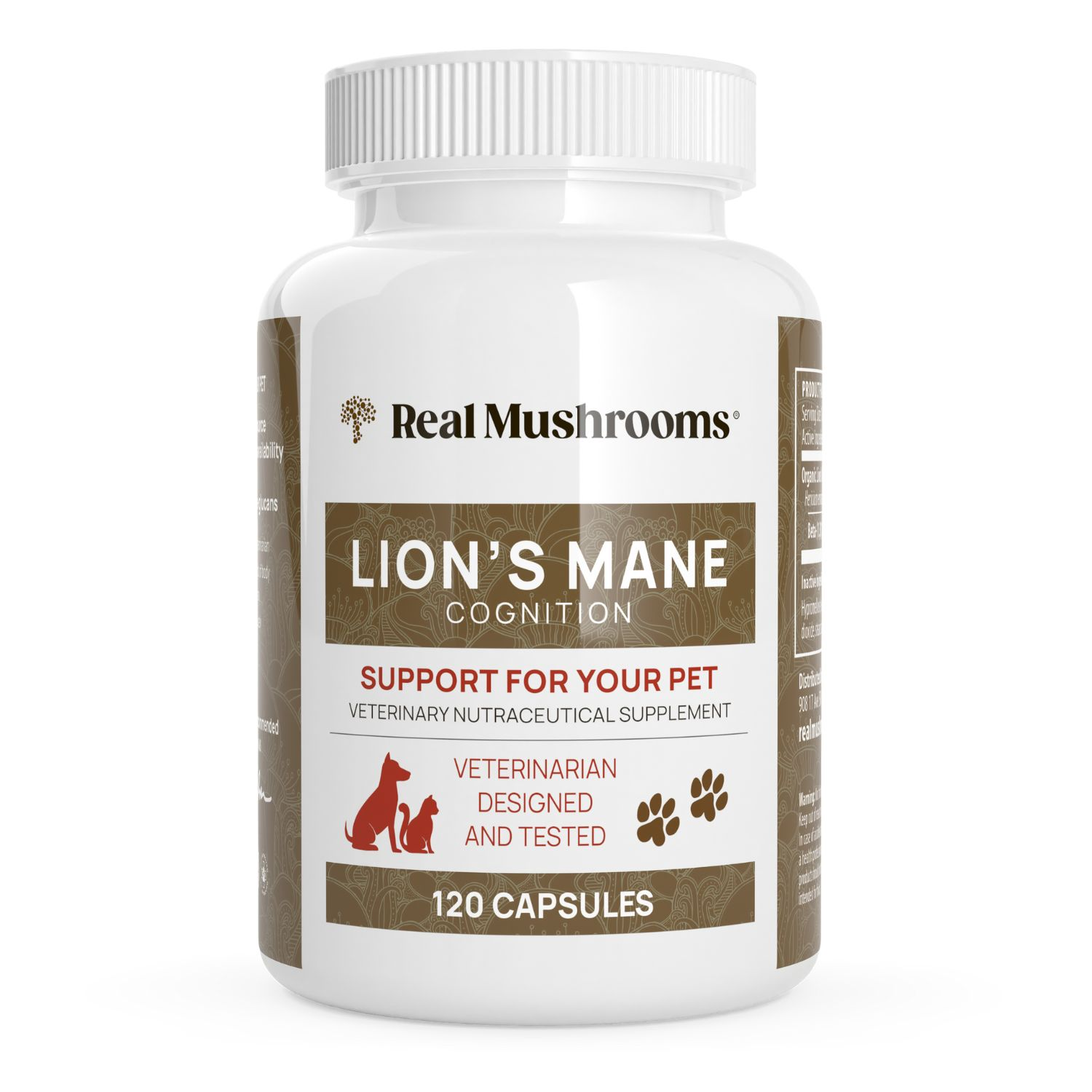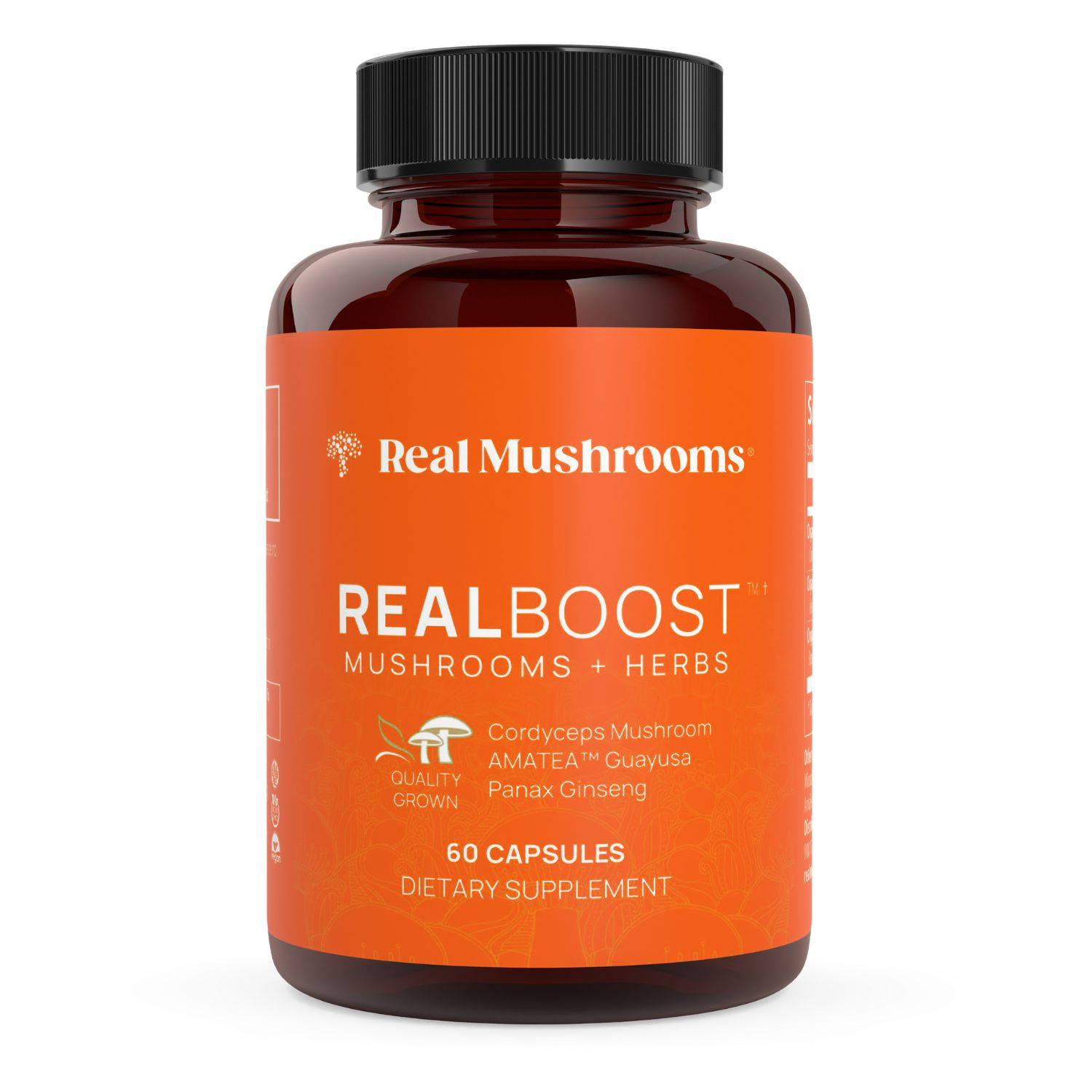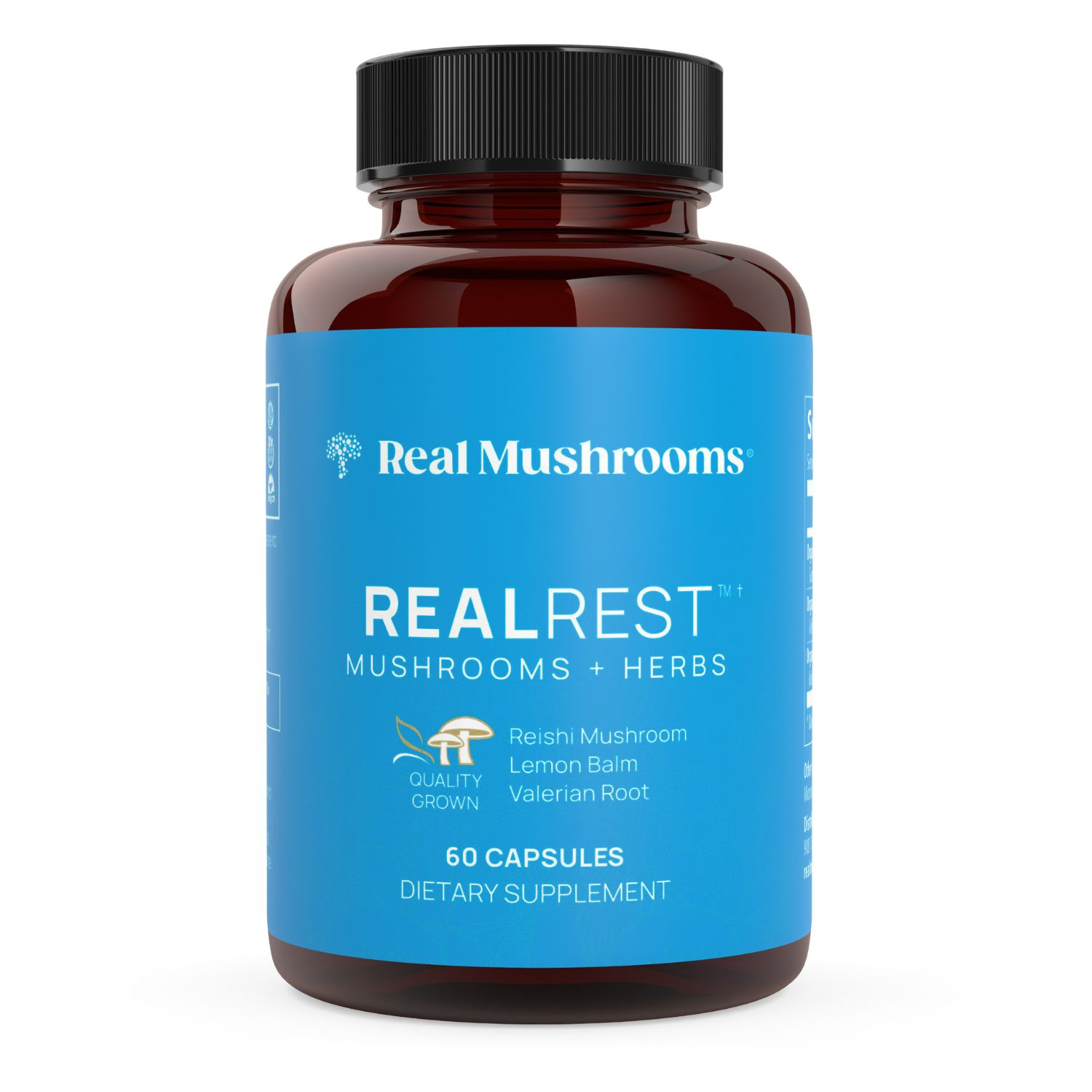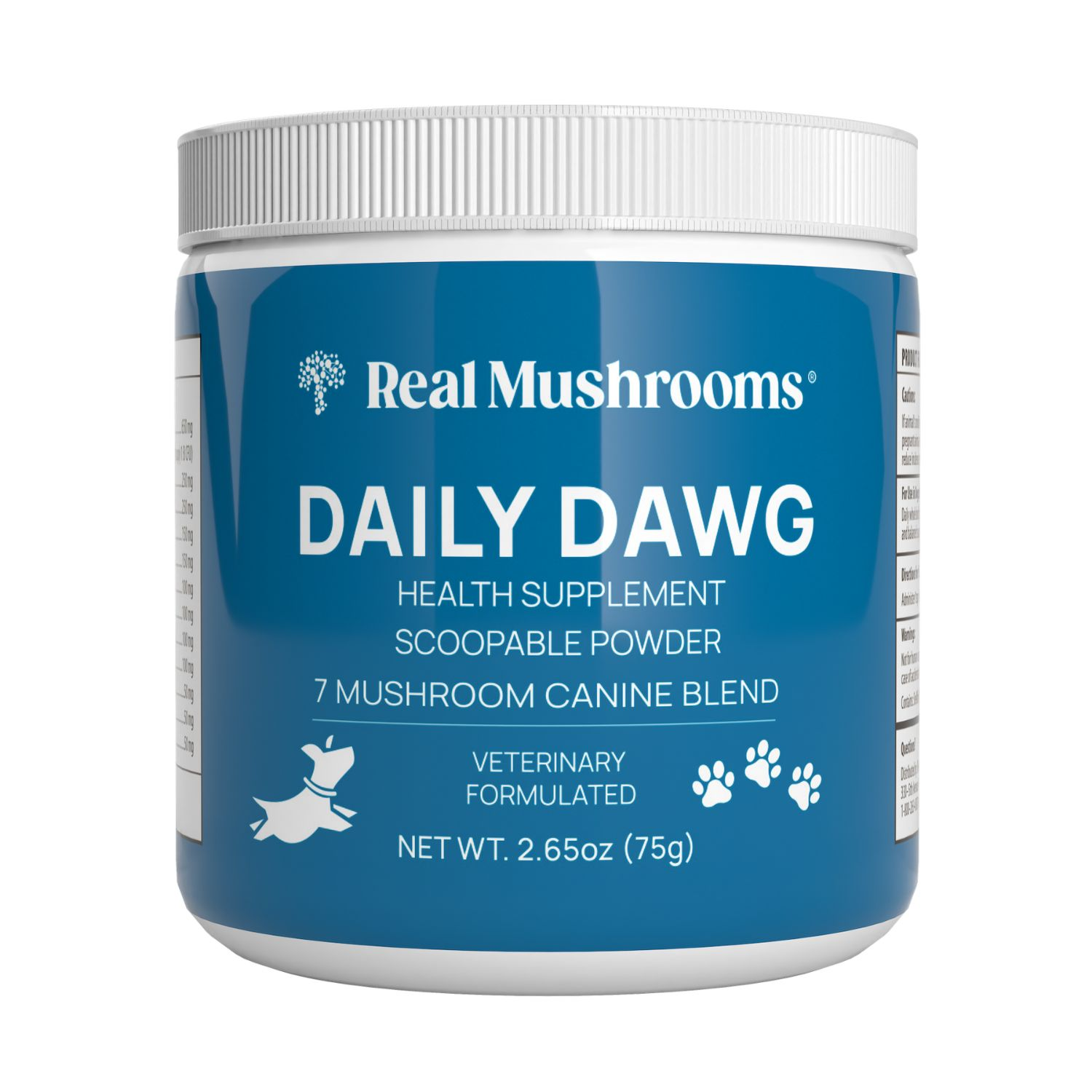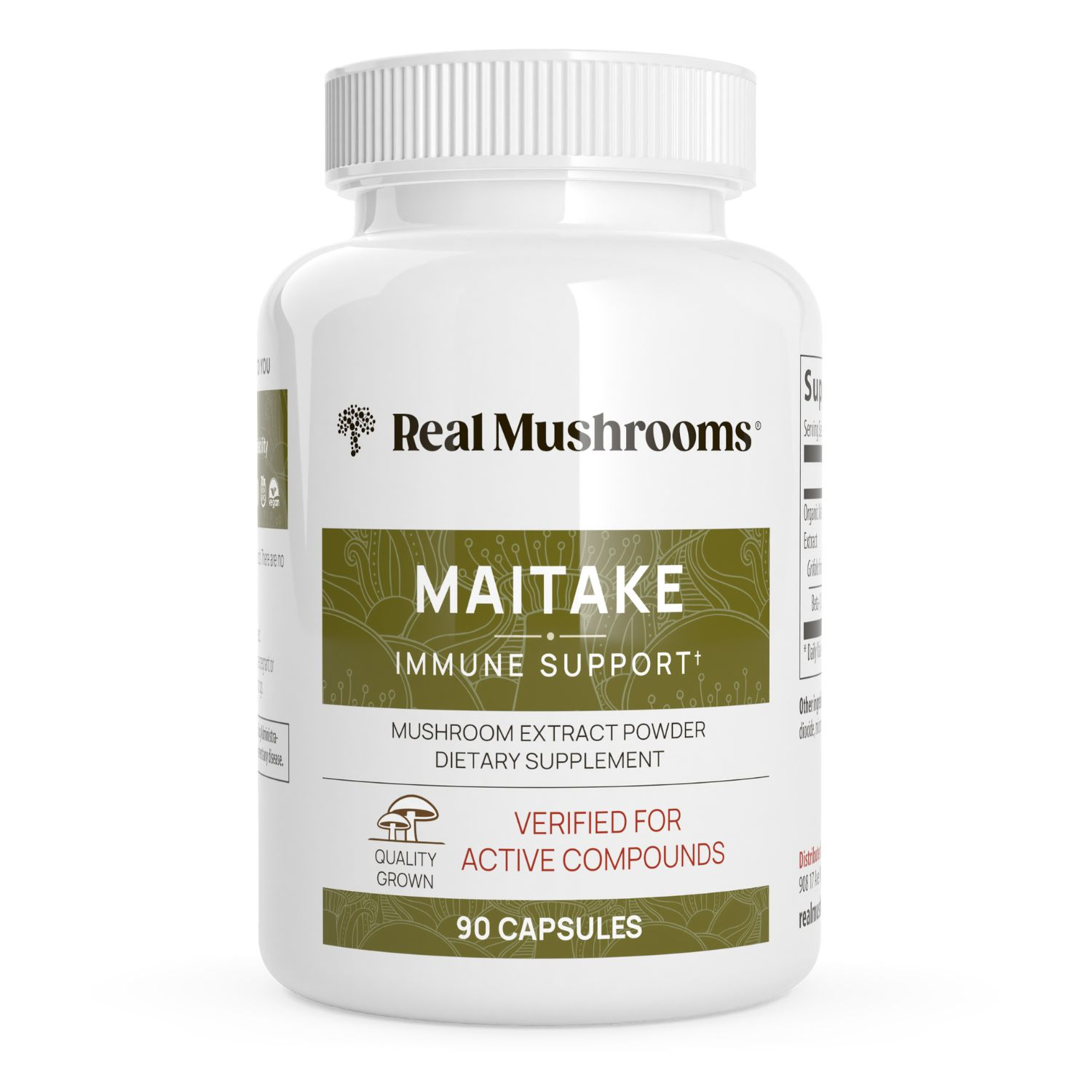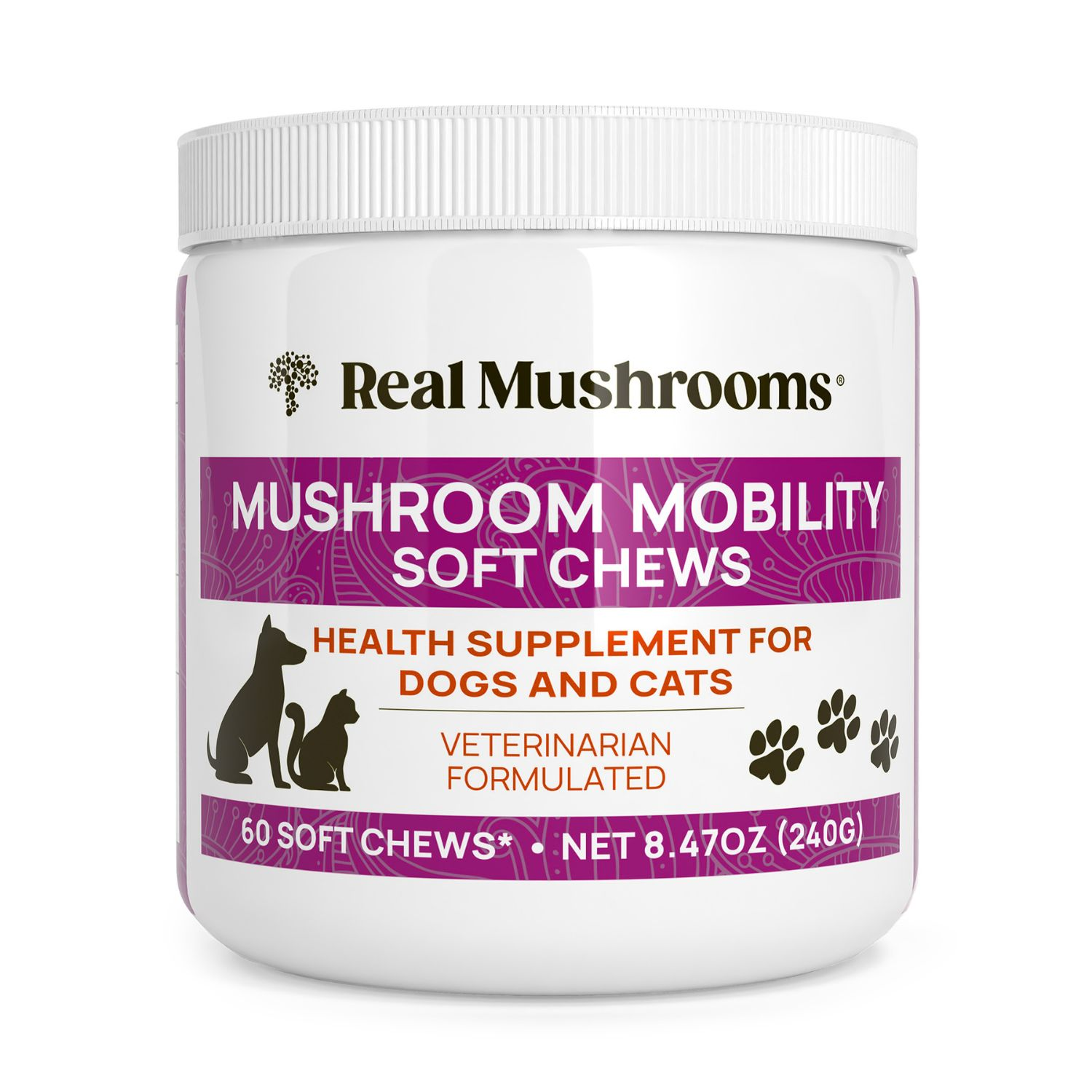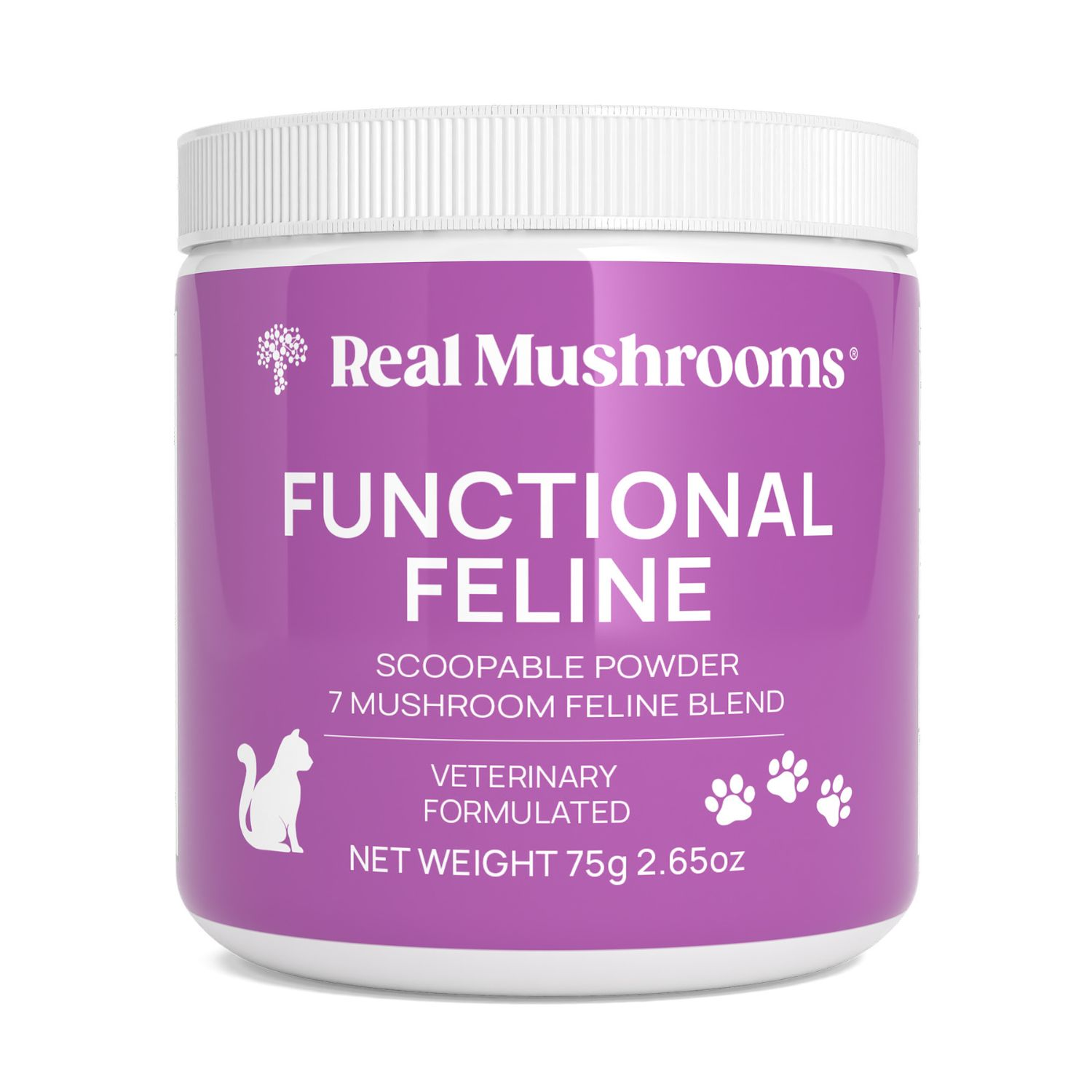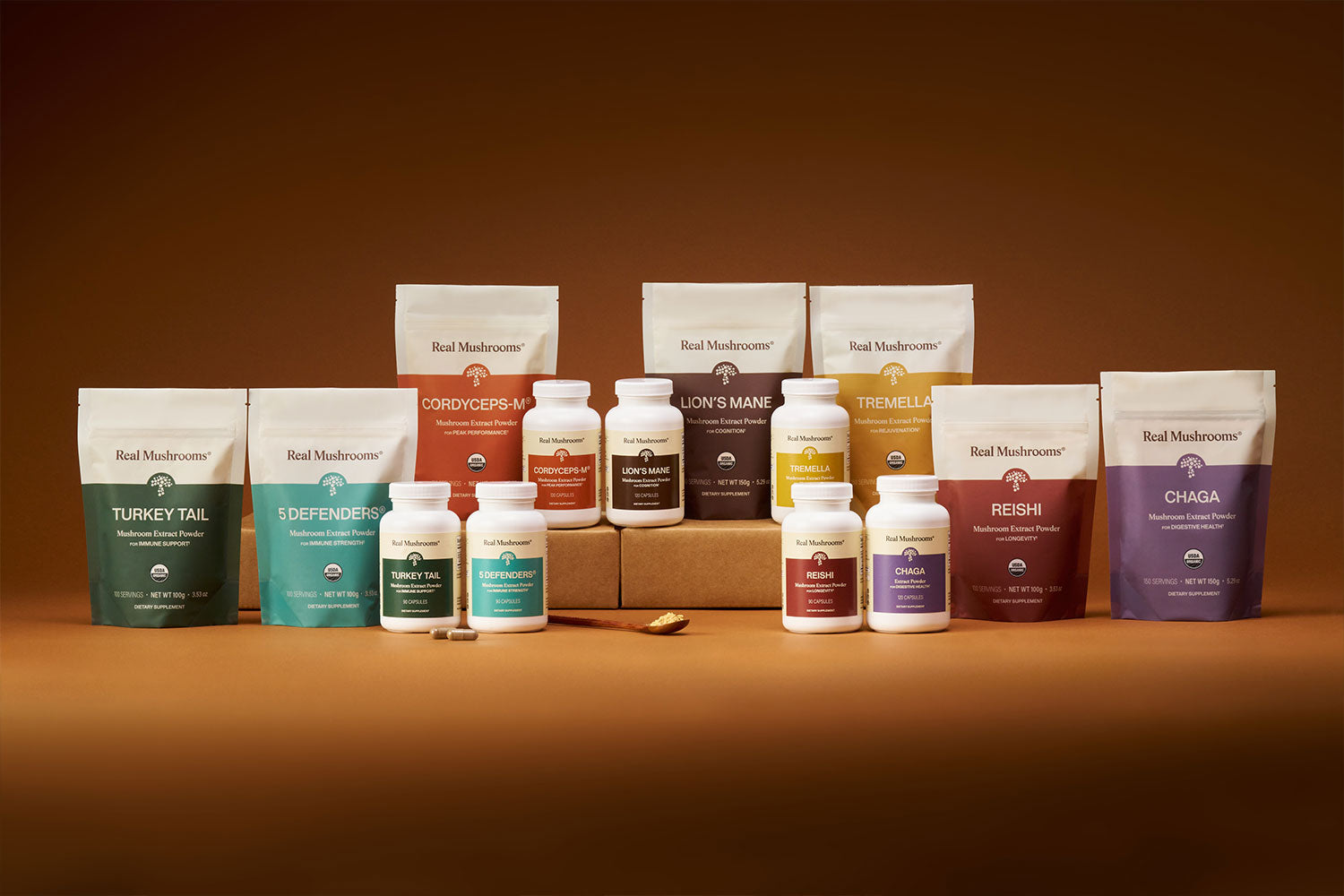Beyond Vitamins: How Mushrooms Are Revolutionizing Natural Nutrition
10 minute read
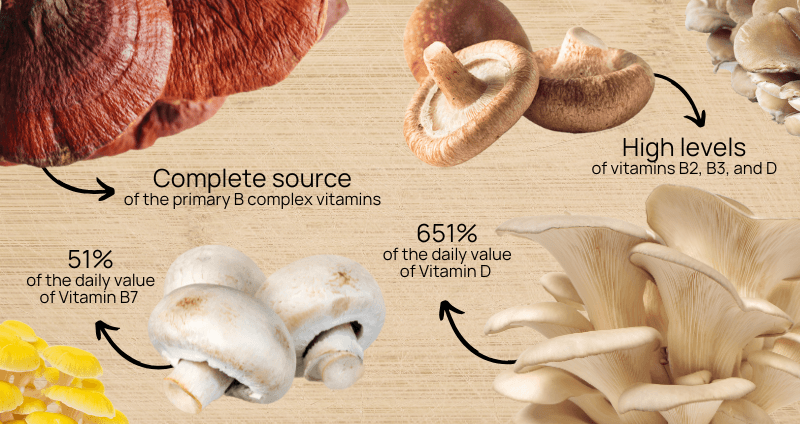
While many appreciate mushrooms for their unique appearance, it's their remarkable nutritional profile that's capturing the attention of health enthusiasts and researchers alike.
As we peel back the layers of mushroom biology, we uncover a treasure trove of support for overall well-being with well-researched nutritional compounds.
In this exploration, we'll examine the fascinating world of nutritional mushroom compounds, uncovering their potential benefits and how their vitamins might complement a health-conscious lifestyle.
Discover the potential of these humble fungi and why they're becoming a focus in the pursuit of natural wellness.
In This Article
- A Look at the Vitamins Contained in Mushrooms
- A Comparison of Mushrooms to Other Natural Sources of Vitamins
- The Potential Nutritional Benefits of Mushrooms
- Can Mushroom Vitamins Boost the Immune System?
- Exploring Mushroom Supplements as Part of a Balanced Lifestyle
- Edible Mushrooms with Notable Nutritional Profiles
- Unlocking the Nutritional Power of Real Mushrooms
A Look at the Vitamins Contained in Mushrooms
Mushrooms are a rich source of essential vitamins that support overall health. Among the most prominent vitamins found in mushrooms are B vitamins, which are important in energy metabolism and supporting healthy skin and brain function. <1>
Specifically, mushrooms are abundant in riboflavin (B2), niacin (B3), and pantothenic acid (B5). These B vitamins help convert food into energy and support the nervous system.
In addition to B vitamins, mushrooms are also a rare non-animal source of vitamin D, particularly when exposed to ultraviolet light.
This is due to the presence of ergosterol, a compound in mushrooms that converts to vitamin D2 upon UV exposure.
According to a study by the International Journal for Vitamin and Nutrition Research, Vitamin D is important for bone health, immune system support, and promoting a healthy inflammation response. <2>
The table below summarizes the key vitamins found in mushrooms and their associated health benefits:

A Comparison of Mushrooms to Other Natural Sources of Vitamins

To discern the health benefits of mushrooms compared to other natural sources of vitamins, it is essential to consider their unique nutritional profile.
Functional mushrooms, such as Agaricus bisporus (common button mushroom), Lentinula edodes (shiitake), and Pleurotus ostreatus (oyster mushrooms), are rich in several essential vitamins, including B vitamins like riboflavin (B2), niacin (B3), and pantothenic acid (B5). <3>
These vitamins play crucial roles in energy metabolism, cellular function, and the maintenance of healthy skin and nerves.
In contrast to fruits and vegetables, which are typically high in vitamins C and A, eating mushrooms provides a distinct set of nutrients that complement these other food groups.
For instance, while fruits, such as oranges and strawberries, are excellent sources of vitamin C, fresh mushrooms offer a significant amount of vitamin D, particularly when exposed to sunlight or UV light. This makes them a valuable dietary component, especially for individuals with limited sun exposure.
Mushrooms also contain ergothioneine, a unique antioxidant not commonly found in other foods. This compound has been shown to protect red blood cells from oxidative stress, further distinguishing mushrooms from other plant-based sources of vitamins. <4>
Their unique vitamin profile, particularly in B vitamins and vitamin D mushrooms (particularly in UV-exposed varieties), along with their antioxidant properties, makes them valuable to a diverse nutritional regimen and healthy immune system.
The Potential Nutritional Benefits of Mushrooms

Mushrooms deliver a potent blend of beta-glucans and antioxidants, fortifying the body's immune and cellular defenses.
Edible mushrooms, including both cultivated and wild mushrooms, offer a range of health benefits supported by scientific research. These benefits stem from the unique composition of vitamins and bioactive compounds found in various mushroom species. <5>
Promotes Nervous System Function
Fresh mushrooms are rich in B vitamins, such as riboflavin (B2), niacin (B3), and pantothenic acid (B5). These vitamins support energy metabolism and help maintain healthy skin and nervous system function.
Immune System Support
One of the most notable benefits of eating mushrooms is their potential to support immune function. Certain edible mushrooms, such as the common button and shiitake mushrooms, contain polysaccharides, particularly beta-glucans, which may enhance the activity of immune cells.
Enhance Cardiovascular Health
More mushrooms in your diet can support a healthy heart and circulation. Ergothioneine, a naturally occurring antioxidant found in mushrooms, helps protect red blood cells from oxidative stress. Additionally, the B vitamins in mushrooms may help regulate homocysteine levels, an amino acid associated with heart health.
A systematic review published in the National Library of Medicine suggests that edible mushrooms may favorably alter lipid profiles by affecting markers such as low-density lipoprotein (LDL) cholesterol and high-density lipoprotein (HDL) cholesterol, potentially leading to improved heart health. <6>
Supports Bone Health
Wild mushrooms and other varieties can be a source of vitamin D, especially when exposed to sunlight or ultraviolet light. Vitamin D supports bone health by facilitating calcium absorption in the gut. This can be particularly beneficial for individuals with limited sun exposure or dietary intake of vitamin D. <7>
At Real Mushrooms, we use only mushrooms (fruiting bodies) in our supplements. This approach ensures that our products contain a high concentration of beneficial compounds, including vitamins and polysaccharides.
We believe in transparency and education, so we provide our customers with detailed information about our sourcing and processing methods. Our commitment to using fruiting bodies sets us apart from products that may contain fillers or other parts of the mushroom.
Can Mushroom Vitamins Support a Healthy Immune System Response?

Mushrooms effortlessly blend into any diet, offering a meaty texture for plant-based meals, low-calorie bulk for weight management, and nutrient-rich umami for keto and paleo enthusiasts alike
Mushroom compounds have gained attention for their potential to support the immune system, a crucial aspect of overall health.
Various edible mushrooms, including cremini mushrooms, shiitake mushrooms, and lion’s mane, contain bioactive compounds that may contribute to immune function.
A study published in the Journal of the American College of Nutrition found that consuming shiitake mushrooms daily improved immune function in healthy adults. <8>
After four weeks, participants who consumed shiitake showed increased levels of gamma delta T-cells and reduced inflammatory markers. This suggests that regular consumption of shiitake mushrooms can enhance immune system activity while also supporting healthy inflammation response.
Beyond beta-glucans, mushrooms offer a variety of vitamins and minerals that can support immune health. For instance, certain mushrooms can be a natural source of vitamin D when exposed to UV light. Vitamin D is believed to play a role in modulating immune responses.
Exploring Mushroom Supplements as Part of a Balanced Lifestyle
To effectively consume mushrooms, it is essential to consider both the form and preparation method to maximize their nutritional benefits. Mushrooms can be consumed in various forms, each offering unique advantages in terms of vitamin retention and bioavailability.
Whole Mushrooms
Consuming fresh mushrooms, such as button mushrooms or cremini mushrooms, is one of the most direct ways to intake of vitamins.
Cooking methods such as sautéing, grilling, or roasting can enhance the flavor while preserving the essential nutrients of chopped mushrooms.
It is advisable to cook mushrooms lightly to maintain their vitamin content, particularly B vitamins, which are sensitive to heat.
Mushroom Extract Powders

Mushroom extract powders offer a versatile option for incorporating vitamins from mushrooms into the diet. These powders can be added to smoothies, soups, or baked goods.
At Real Mushrooms, we ensure our mushroom powders are made exclusively from fruiting bodies, which are known to contain higher concentrations of beneficial compounds compared to mycelium-based products.
Our commitment to quality extends beyond ingredient selection. Our products are USDA Certified Organic, Gluten-Free, Non-GMO, and 100% Vegan. This approach allows us to provide our customers with mushroom powders that deliver the full potential of these functional fungi.

Capsules and Supplements

For those who prefer a convenient and precise dosage, mushroom capsules and supplements are an excellent choice. These products often contain standardized amounts of beta-glucans and are made from high-quality mushroom extracts.

Fermented Mushrooms
Fermentation can enhance the bioavailability of vitamins in mushrooms. This process breaks down the cell walls, making nutrients more accessible for absorption. Fermented mushroom products can be consumed as part of a meal or as a standalone supplement.
Edible Mushrooms with Notable Nutritional Profiles

From immune-boosting shiitake to vitamin D-packed maitake, this diverse array of edible mushrooms showcases nature's nutritional powerhouses, each offering a unique spectrum of health-enhancing compounds
In the realm of natural nutrition, certain types of mushrooms are recognized for their unique nutritional profiles and potential health benefits. Let's explore some of these functional fungi and why mushrooms are good for your health:
Shiitake Mushrooms
Shiitake mushrooms are known for their high levels of B vitamins, particularly B2 (riboflavin) and B3 (niacin), which support energy production and cellular function. They also contain vitamin D2, which is important for bone health and immune function. <8>
Shiitake mushrooms are commonly used in cooking, making them an accessible source of these nutrients. Eat mushrooms like shiitake to enjoy their amazing health benefits.
Maitake Mushrooms
Maitake mushrooms are notable for their vitamin D and B vitamin content. They have been studied for their potential to support immune health and metabolic function.
Maitake contains polysaccharides, including beta-glucans, which are believed to interact with the body's immune system. Adding more mushrooms like maitake to your diet can support beneficial gut bacteria.
Research indicates that these compounds found in maitake may support balanced immune responses by stimulating various immune cells, including natural killer (NK) cells and macrophages. <9>
Oyster Mushrooms
Oyster mushrooms provide a rich source of vitamin D, with a single serving offering 651% of the daily value. <10>
Vitamin D has many health benefits, including supporting bone health, immune function, and calcium absorption.
Additionally, these mushrooms are a good source of dietary fiber and iron, which can contribute to overall digestive health and support oxygen transport in the blood. <10>
Furthermore, species such as golden oyster mushrooms contain high levels of ergothioneine, an amino acid known to support longevity markers.
Unlocking the Nutritional Power of Real Mushrooms
To sum it all up, the health benefits of mushrooms extend far beyond their culinary applications.
Rich in essential nutrients like B-complex vitamins, vitamin D, and unique compounds such as beta-glucans and ergothioneine, mushrooms offer potential support for immune function, cognitive health, and overall wellness.
At Real Mushrooms, we harness these benefits by focusing exclusively on organic, high-quality mushrooms (fruiting bodies) in our supplements. Furthermore, our products never contain any fillers, starches, or myceliated grain.
This approach ensures that our products deliver the full spectrum of beneficial compounds found in mushrooms without anything diluting this potency.
Whether you choose to eat more mushrooms in your diet or supplement with our carefully crafted products, incorporating these functional fungi into your wellness routine can be a valuable step towards supporting your health.
As always, while mushrooms offer promising benefits, they should be part of a balanced diet and healthy lifestyle, not a replacement for professional medical advice.

Related Articles
- A Lazy Dieter’s Guide to Consuming Functional Mushrooms
- Unlocking the Power of Ergothioneine: The Cognitive Benefits of Mushrooms
- Do Mushrooms Have Protein? 4 Findings and Other Nutrition Facts
- Mushrooms & Herbs for Hormone Balance: 8 Natural Aids for Women
References
- Cardwell, G., Bornman, J., James, A., & Black, L. (2018). A review of mushrooms as a potential source of dietary vitamin D. Nutrients, 10(10), 1498. https://doi.org/10.3390/nu10101498
- Huang, G., Cai, W., & Xu, B. (2016). Vitamin D2, ergosterol, and vitamin B2 content in commercially dried mushrooms marketed in China and increased vitamin D2 content following UV-C irradiation. International Journal for Vitamin and Nutrition Research, 87(5–6), 237–246. https://doi.org/10.1024/0300-9831/a000294
- Nutrient content and nutrient retention of selected mushrooms. (n.d.). USDA ARS. Retrieved October 15, 2024, from https://www.ars.usda.gov/ARSUserFiles/80400525/articles/ift2006_mushroom.pdf
- Kozarski, M., Klaus, A., Jakovljevic, D., Todorovic, N., Vunduk, J., Petrović, P., Niksic, M., Vrvic, M., & Van Griensven, L. (2015). Antioxidants of edible mushrooms. Molecules, 20(10), 19489–19525. https://doi.org/10.3390/molecules201019489
- Venturella, G., Ferraro, V., Cirlincione, F., & Gargano, M. L. (2021). Medicinal mushrooms: bioactive compounds, use, and clinical trials. International Journal of Molecular Sciences, 22(2), 634. https://doi.org/10.3390/ijms22020634
- Krittanawong, C., Isath, A., Hahn, J., Wang, Z., Fogg, S. E., Bandyopadhyay, D., Jneid, H., Virani, S. S., & Tang, W. W. (2020). Mushroom Consumption and Cardiovascular Health: A Systematic review. The American Journal of Medicine, 134(5), 637-642.e2. https://doi.org/10.1016/j.amjmed.2020.10.035
- Keegan, R. H., Lu, Z., Bogusz, J. M., Williams, J. E., & Holick, M. F. (2013). Photobiology of vitamin D in mushrooms and its bioavailability in humans. Dermato-Endocrinology, 5(1), 165–176. https://doi.org/10.4161/derm.23321
- Dai, X., Stanilka, J. M., Rowe, C. A., Esteves, E. A., Nieves, C., Spaiser, S. J., Christman, M. C., Langkamp-Henken, B., & Percival, S. S. (2015). ConsumingLentinula edodes(Shiitake) Mushrooms Daily Improves Human Immunity: A Randomized Dietary Intervention in Healthy Young Adults. Journal of the American College of Nutrition, 34(6), 478–487. https://doi.org/10.1080/07315724.2014.950391
- Vetvicka, V., & Vetvickova, J. (2014). Immune-enhancing effects of Maitake (Grifola frondosa) and Shiitake (Lentinula edodes) extracts. PubMed. https://doi.org/10.3978/j.issn.2305-5839.2014.01.05
- Pandey, M. et al. (1970) Mushrooms for integrated and diversified nutrition, Journal of Horticultural Sciences. Available at: https://www.redalyc.org/journal/5770/577073671002/html/ (Accessed: 20 June 2024).
